NC state legislative preview




For decades now, a silent trend has emerged that has now ballooned into a real problem. While girls and women have seen increased educational opportunities over the last 50 years and largely excelled, men have found less value in education while also struggling more to meet academic standards. More people are becoming aware of this phenomenon, and the question is, what do we do about it?
Haywood commissioners issue joint statement on Ramey....................................4 Property values on the rise in Macon............................................................................5
Western legislators weigh in on upcoming General Assembly session..............6
From kindergarten through college, men struggle in school..................................8 Taylor pleads guilty, judge commends him on alcohol recovery..........................19
The trap of correlation — how science works............................................................20 Relying on friends and signs from the universe........................................................21
Finding a sense of balance: Cherokee artist unveils latest pieces....................22 Straight up or subtle satire? You decide....................................................................29
WCU alum helps preserve coastal parks through NPS grant............................30 Notes from a plant nerd: The winter forest................................................................34
E DITOR /PUBLISHER: Scott McLeod. . . . . . . . . . . . . . . . . . . . . . . . . . . . . . . info@smokymountainnews.com
ADVERTISING D IRECTOR: Greg Boothroyd. . . . . . . . . . . . . . . . . . . . . . . . . . . . . greg@smokymountainnews.com
ART D IRECTOR: Micah McClure. . . . . . . . . . . . . . . . . . . . . . . . . . . micah@smokymountainnews.com
D ESIGN & WEBSITE: Travis Bumgardner. . . . . . . . . . . . . . . . . . . . . . . . . . travis@smokymountainnews.com

D ESIGN & PRODUCTION: Jessica Murray. . . . . . . . . . . . . . . . . . . . . . . . . jessica.m@smokymountainnews.com
ADVERTISING SALES: Susanna Shetley. . . . . . . . . . . . . . . . . . . . . . . . . susanna.b@smokymountainnews.com


Amanda Bradley. . . . . . . . . . . . . . . . . . . . . . . . . . . . jc-ads@smokymountainnews.com
Sophia Burleigh. . . . . . . . . . . . . . . . . . . . . . . . . . sophia.b@smokymountainnews.com
C LASSIFIEDS: Scott Collier. . . . . . . . . . . . . . . . . . . . . . . . . . . classads@smokymountainnews.com

N EWS E DITOR: Kyle Perrotti. . . . . . . . . . . . . . . . . . . . . . . . . . . . . . . . kyle.p@smokymountainnews.com
WRITING:
Holly Kays. . . . . . . . . . . . . . . . . . . . . . . . . . . . . . . . . . holly@smokymountainnews.com
Hannah McLeod. . . . . . . . . . . . . . . . . . . . . . . . . . . hannah@smokymountainnews.com
Cory Vaillancourt. . . . . . . . . . . . . . . . . . . . . . . . . . . . . cory@smokymountainnews.com
Garret K. Woodward. . . . . . . . . . . . . . . . . . . . . . . . garret@smokymountainnews.com
ACCOUNTING

There are so many diets and diet books out there… before you buy that book or try that diet your friend or neighbor recommended ask yourself these 5 questions:

WHO devised the diet? What are their credentials or experience in nutrition?





WHAT evidence is the diet based on? Is the diet based on sound science, evidence,and research or only on testimonials and anecdotes?











WHAT is the diet about? Is the diet highly restrictive and does it eliminate entire food groups? Does it require that you to buy supplements because you aren’t eating a balanced diet?
DOES the diet recommend other lifestyle changes and improvements? Our eating habits, and whether we are able to lose weight, are often influenced by other factors like exercise and physical activity, sleep, illnesses and diseases, medications and stress. Does the diet address these other aspects of your health?
CAN you sustain this? Consider how the diet will affect your life. Can you afford to buy the foods recommended? How much time will it take to shop and prepare meals? Will everyone in the family be able to eat those foods? Will you be able to enjoy food at restaurants and meals made by friends or will you be confined to only eating at home? Are the foods readily available at your local Ingles Market?

Republican Commissioner Terry Ramey should pay his taxes and stop threatening the media for reporting on the issue, according to a rare joint statement issued by the other four Republicans on the Haywood County Board of Commissioners.
“An election was held and 26,927 voters cast a ballot. Of those, 13,498 (50.13%) voted to elect Mr. Ramey. The issue about his taxes had been reported and printed in the press prior to the election. Our taxes support our schools, community college, EMS, fire departments, sheriff’s department, library, mandated state/federal programs and many other initiatives that enhance our quality of life,” reads the statement, sent to The Smoky Mountain News by Chairman Kevin Ensley on Jan. 11 and bearing the names of fellow commissioners Jennifer Best, Tommy Long and Brandon Rogers. “Our opinion is that, as an elected official, we should be an example and promptly pay our taxes.”
On Sept. 28, 2022, The Smoky Mountain News first reported that a candidate for Haywood County Board of Commissioners, Terry Eugene Ramey, owed thousands in back taxes to the county, with at least one bill dating back to 2012. This fiscal year, the county will collect more than $52 million in property taxes — by far its largest source of income.
At that time, Ramey said he’d pay the bills if they were valid. A subsequent review of the bills with the county’s tax assessor determined that the bills are indeed valid. On Nov. 8, 2022, Ramey
earned enough votes to claim the last of three contested seats, despite his delinquencies.
As of Jan. 10, Ramey still has 13 outstanding tax bills in Haywood County.
Since being sworn into office on Dec. 8, Ramey has cast 13 votes, some of them concerning more than $38,000 of taxpayer money — all without paying his own taxes.
Ramey has repeatedly threatened multiple individuals at The Smoky Mountain News for bringing light to his delinquencies, both before and after the election.
“It is never acceptable for public officials
to threaten the press,” the commissioners’ statement reads. “The Constitution’s First Amendment guarantees freedom of the press. This was granted along with the other amendments to protect the Republic and everyone’s freedoms. Newspapers have ‘letters to the editor’ for an elected official, or anyone for that matter, to refute what they believe to be misinformation.”
When asked if they thought Ramey should recuse himself from board votes until he pays his taxes, or resign, commissioners said that it was up to the public to demand those outcomes.
“The voters of Haywood County elected Mr. Ramey and he will have to face them,” they said. “The county commission has a public comment session at every regular board meeting. If Haywood County voters have lost their trust in him, then they have the opportunity to voice whether or not a resignation is in order.”
Now that Ramey receives a paycheck — about $1,000 a month — from the very county he’s been stiffing on tax bills for the past 11 years, there’s been talk about garnishing those wages.
When asked if the county should take that step, commissioners deferred to the county’s tax collector.
On Jan. 11, Republican Tax Collector Sebastian Cothran said that he wouldn’t garnish Ramey’s earnings because Ramey had signed up for a payment plan.
“Usually if they’re working with us, we wouldn’t do that,” Cothran said.
Details of the plan, made available to SMN by Cothran, state that Ramey is to pay $300 a month until the debts are fully paid. In the interim, he’ll be charged .75% interest per month, and 2% each January, should the debts last that long. Both rates are set by state statute.
That means Ramey should have his debts paid off by this coming December, if he doesn’t miss any payments or make any additional payments.
During that time, county commissioners will work on and vote to implement the county’s next budget, likely nearing the $100 million range.
AWaynesville resident who wants to buy a parcel from the town may or may not get their way after alderman approved the sale, but discussion surrounding the deal revealed continuing concerns over the availability of housing in the area.
“We have a tremendous need for workforce housing,” said Alderman Chuck Dickson, during a Jan. 10 meeting where Chris Amsler, of Oakdale Road, had made an offer to buy a parcel directly across the street from his house.
Amsler told aldermen his intent was to ensure nothing would be built on the .83-acre lot, which has access to city water and sewer. He offered the assessed value of $31,700 for the teardrop-shaped parcel, which sits like an island between Oakdale Road and Grayden Street.

Dickson raised the possibility of donating the parcel to Mountain Projects or Habitat for Humanity with the idea that a few small homes, perhaps as many as four, could be built on the lot. Property taxes on the developed parcel would be higher, resulting in more revenue for the town.
Alderman Anthony Sutton disagreed with Dickson on the feasibility of putting multiple homes there.
“I don’t think it would really suit housing with how narrow the street is on the side, but I think it would be worth
going to Habitat for Humanity to see,” Sutton said.
Alderman Julia Boyd-Freeman agreed with Dickson on the need for housing of all types, but said she wasn’t in favor of donating the parcel, instead suggesting the town talk to Mountain Projects about it first.
Alderman Jon Feichter said he concurred with Dickson and Freeman on the need and also wanted to see if there was interest from Mountain Projects or Habitat first.
Rob Hites, Waynesville’s town manager, offered to continue the issue to the next meeting after talking to the groups, and also reminded the board that the sale would still be subject to the upset bid process.
Gary Caldwell, Waynesville’s mayor, made a rare motion of his own to accept Amsler’s offer and let the upset bid process determine the owner. Sutton seconded, and with the vote of Freeman the motion passed over the opposition of Dickson and Feichter.
The upset bid process means that the sale to Amsler will be advertised and gives prospective bidders 10 days to top the $31,700 deal. New bidders must top the existing price by the greater of $750 or 5% of the price. Such a bid would reset the 10-day clock on the
process, allowing other bidders to emerge until there are no more.
The future of a unique parcel owned by the Town of Waynesville remains up in the air, for now.

Macon County is undergoing a tax reappraisal this year, and while the numbers are jarring, they won’t be a surprise to anyone who has borne witness to the rising prices of the crowded housing market in Western North Carolina since the start of the pandemic.
“The pandemic is when all of this start-
County is $12.6 billion.
“This is not the final number, there’s a lot of adjustments that go into this number,” said Braswell.

That is a 58.8% increase in taxable property value since the last reappraisal in 2019. This does not mean that every Macon County property increased by 58.8%, but rather that the average of all increases came out to 58.8%. Supply and demand, stability of the local economy, building costs and interest rates all affect the outcome of mass appraisal.
2008 they were financing. There’s not a lot of financing right now, everything is cash. And if you have the cash and you want it badly enough, you’ll pay whatever.”
Braswell noted that not all properties will increase in value by 58.8%. Some properties will go up more than the average and some less. She also pointed out that the tax rate will be decided by commissioners later this year during the regular budget season.
“The millage rate, not tax assessment, is what determines what the taxes will be for the year,” said Braswell. “Taxpayers need to understand that the assessment is going up on that average, not the taxes. The millage rate will not be set until June of 2023.”
something wrong with your reappraisal, it’s not good,” said Braswell. “There’s a base rate for every building, and it’s based on the market. That’s how we got to this number. It increased because somebody had the money and wanted that property and paid it.”
Another home in Burningtown, built in 1976 and set on 3.9 acres, was appraised for $121,870 in 2022. In December 2022 the home sold for $245,000. That’s an increase of $122,060 or 100%. The 2023 appraisal for the home will be $243,930.
This tiny home, located in Franklin, sold for $182,500 in 2021 increasing the property value by 73%. Donated photo
ed, July of 2020 I believe is when all this kind of flipped out of control,” said Abby Braswell, Macon County tax administrator, during a presentation to county commissioners Jan. 10. “That is when all the sales started and all the values went up, as you can see there’s still people moving here.”
Sales for 2022 are done, and now the tax office has a lot of work to do until it sends out revaluation notices in February. While the number won’t be final for several months, the estimated 2023 reappraisal real property taxable value for Macon
The North Carolina Department of Revenue requires counties to conduct a reappraisal at least every eight years in order to adjust properties to 100% market value. North Carolina General Statute requires that taxable value is within 10% of 100% market value. The last reappraisal done in the county took place in 2019, after which there was a 2% drop in property value. The last reappraisal that saw a bigger increase than the one estimated for 2023 took place in 2007, when property values increased by more than 69%.
“I’ve heard comments that it’s going to be like 2008 again,” said Braswell. “Well unfortunately, most of the people that are buying property here are using cash. In
Additionally, once Macon residents receive their revaluation notice, there is the opportunity for appeal.
In 2021, there were 1,857 qualified property sales in Macon County, up from 1,794 in 2020, compared with 1,479 qualified sales in 2022.
“From last year to this year every township had a decrease, except for two, Ellijay and Flats, they actually increased in the number of sales,” said Braswell. “So, there was an overall 20 percent decrease in the number of qualified sales. But if you look at the values, they’re still holding as far as high and low.”
In her presentation to the board, Braswell gave several examples of properties that had dramatically increased in value over the last couple of years.
One tiny home in Franklin on a .48-acre lot assessed at $103,310 sold in December 2021 for $182,500. Partly because of this purchase price, the 2023 assessment for the property will be $179,150, an increase of over $75,000 or 73%.

“If we don’t follow the sales, our sales ratio can’t hit the [market value], and if that happens the state comes in and says there’s
“This house has not been redone, it has had no renovation whatsoever,” said Braswell. “It looks like it was built in the seventies if you look at the inside of it. So, what these people are buying is the land where they’re at.”
One home in Highlands that sold for $485,000 in May 2020 sold for $1,275,000 in December of 2022, increasing its value for the 2023 appraisal by over 162%. Also in Highlands, a commercial building on a .07acre corner lot built in 1912 assessed at $889,270 in 2022 and then sold for $2 million in December 2022.
“These are December sales, these are not last year sales, these are right now,” said Braswell.

Reappraisal notices will be sent out in early February. Between February and March residents can go through an informal review process to request adjustments to their assessed property value. Then, notices will be sent out informing property owners whether their adjustments were granted. If adjustments are not granted, those people can appeal to the Board of Equalization and Review. Review hearings will begin in April.
“The purpose of a revaluation is to equal out everybody’s tax burden so that everybody is paying the same based on their market value,” said Braswell.
 BY CORY VAILLANCOURT P OLITICS E DITOR
BY CORY VAILLANCOURT P OLITICS E DITOR
An awkward Hazelwood intersection could be scrapped ahead of planned North Carolina Department of Transportation improvements to South Main Street, as long as there’s no opposition from area business owners.
The possibility comes as the result of a request by NCDOT to eliminate the intersection where Lea Plant Road and Hemlock Road come together and intersect with South Main Street.
“This is just one area where because there is a town right of way involved, they need your permission to move ahead with this design,” said Elizabeth Teague, Waynesville’s Development Services Director.
In doing so, Lea Plant and Hemlock create a large, open area that isn’t clearly marked with turn lanes, white borders or
yellow lines.
If the change is approved, the roads will come together as they do now but will no longer provide access to South Main Street.

Teague said the idea was to try to make it safer and to eliminate intersections on to South Main.
“I think this is a great idea to do for safety reasons,” said Alderman Anthony Sutton, who added that since he lives in the vicinity, he uses the intersection regularly.
Waynesville’s Fire Department said the closure wouldn’t cause them any problems.
Aldermen were set to consider approv-
unduly affect their operations.
“It seems to me that the only people who might have an objection to this might be the two businesses there,” said Alderman Chuck Dickson.
Aldermen will have plenty of time to make the decision; the project is now slated to begin its first phases in 2029, after DOT mismanagement and inflation threw projects across the state into disarray.
This intersection could be eliminated, if and when the South Main Street improvement project ever happens.
Google photo
Waynesville Police Chief David Adams said he can’t recall any problems with the intersection but said it may indeed help make the area safer.
ing the request on Jan. 10 but decided to hold off until speaking to the businesses in the area to ensure the closure wouldn’t
“I think right now DOT is so far behind trying to rectify the amount of projected income and the rising prospective costs of construction that unless a project is under construction or out to bid, it’s kind of a case-by-case basis,” Teague said.
The first serious discussions about the South Main Street Project took place back in 2002 and were revived in 2009. Formal plans were first announced in August 2018. At that time, the plan was set for a 2024 kickoff.
North Carolina’s General Assembly convened last Wednesday, beginning a new session with new dynamics that will come into play as members seek to resolve a host of long-lingering issues.
“It’s going to be a good session with a lot of good bipartisan work across the aisle. We had that last time,” said Sen. Kevin Corbin (RFranklin). “I know you hear about political differences that make the headlines but overall, compared to other states, we don’t do it perfectly but I think we do it better than other states do.”
Corbin cited the strong financial position of the state, as well as the recent CNBC ranking of North Carolina as the top state in which to do business, but the government’s current setup leaves plenty of room for those political differences to emerge.
Democratic Gov. Roy Cooper’s second term will come to an end next year. Until then he’ll still wield veto power over the Republican-dominated General Assembly. Republicans, buoyed by the results of the 2022 General Election, are only one seat short of having the numbers to override Cooper’s vetoes. While there exists a veto-proof majority in the Senate, it would still take at least one Democrat in the House to cross party lines to squash action from Cooper.
On the first day of the session, Speaker Tim Moore (R-Cleveland) announced he’d do away with the customary advance notice for veto override votes, meaning if just one Democrat is caught unawares, they won’t be there to uphold Cooper’s veto.
And more good fortune came to Republicans on the state’s Supreme Court, which because of the 2022 General Election will now operate with a 5-to-2 Republican majority.
During the campaign, Republicans had accused the Democrat majority of playing politics on the court, and a Sept. 9, 2022 press release from the NCGOP says that the party “will continue to work tirelessly to safeguard our courts from partisan judicial activism.”
However, on Jan. 4, NCGOP Chair Michael Whatley foreshadowed future partisan judicial activism by lauding a politically conservative Supreme Court, making party-line decisions in favor of Republicans highly likely.
With the General Assembly and Supreme Court in solid conservative control, North Carolina Republicans look to be nearly unstoppable in the coming session.
Now, they’ll consider how to serve all the people of this politically divided state by settling several key issues — with or without the help of Democrats.
Last June, the conservative-led United States Supreme Court struck down the 50-
year-old Roe v. Wade ruling that guaranteed the right to an abortion under certain circumstances. The Court’s decision in Dobbs v. Jackson didn’t outlaw the procedure, but did kick it back to the states to decide for themselves.
North Carolina legislators didn’t rush into anything rash, so the pre-existing 20week ban remains in place, making the state an abortion destination in the Southeastern U.S.
This past December, House Speaker Tim Moore (R-Cleveland) and Senate President Pro Temp Phil Berger (R-Rockingham) told the Associated Press that they’d consider restrictions.
Last fall, Haywood’s Republican Rep. Mark Pless told The Smoky Mountain News he believes a “heartbeat” bill will be introduced this session. He’s hoping for a bi-partisan effort to enact restrictions.
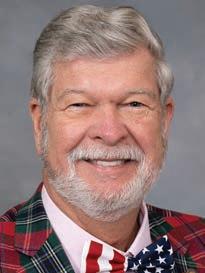
“Personally, I think once the baby is formed, and it actually has a heartbeat, I think it’s a baby,” said Pless, a former EMT. “I’ve heard people say that it’s not, but through my years in EMS, I had some babies that were stillborn, born at two and three months, and you knew they were a baby.”
Corbin is also looking for bipartisanship on the issue, and as the newly appointed cochair of the Senate’s healthcare committee will likely have an outsized impact on the final product.
“Passing a bill that only narrowly passes and doesn’t have widespread support, it’s probably going to be vetoed by the governor
and is probably not going to have the votes for an override,” he said. “I won’t say it’s a waste of time — you can certainly pass bill to make a point or to stake out your position — but I think if we’re serious about changing the current abortion law, we need to come to some kind of consensus among members.”
Corbin’s fellow Macon County Republican legislator, Karl Gillespie, says he favors a heartbeat bill with exceptions for rape and incest. Rep. Mike Clampitt (RSwain) is the son of a single mother, and has voiced support for the pro-life position in the past. He said he hopes any abortion bill benefits the infant.
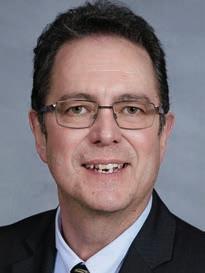
Democrats, meanwhile, have staked out predictable positions on reproductive rights.
“I know that our governor will veto any further abortion restrictions moving forward,” said Rep. Lindsey Prather (DBuncombe). “Of course, we’re one seat away from Republicans being able to override that, so it’s going to be especially crucial, particularly on this issue, that Democrats stick together.”
Prather represents southwestern Buncombe County and is beginning her first term in the General Assembly. Buncombe Democrat Caleb Rudow, who was appointed last February to finish the term of Susan Fisher, won his first election in November and represents northwestern Buncombe.
“I hope we codify Roe,” Rudow said. “I hope we have protections for people and allow people to do what they want with their bodies and not infringe on people’s personal rights.”
Eric Ager (D-Buncombe) represents the eastern part of the county.


“I think it would be a mistake on the part of the Republican Party to try to change the way that we do healthcare here in North Carolina,” Ager said.
Ager, Rudow and Prather all said they wouldn’t support any bill shortening North Carolina’s 20-week abortion limit.
It’s been an issue for years in North Carolina, even resulting in a three-year state budget standoff when Cooper refused to back down and Republicans couldn’t override his veto, but Medicaid expansion inched closer to passage near the end of 2022 and may finally be resolved during the current session.
“Like Barbara Mandrell singing ‘I was
country when country wasn’t cool,’ I was for Medicaid expansion when Medicaid expansion wasn’t cool,” Corbin said.
And he was, becoming one of very few Republicans who supported the idea several years back. Now, he’s looking squarely at the House to seal the deal.
“We passed it with overwhelming bipartisan support,” Corbin said. “It went through Republicans, Democrats, everybody kind of locked arms and went across the finish line with that one in the Senate. At this point, I do feel like it’s in the House’s lap.”
Pless wants to see the state’s doctor shortage addressed first, saying that it won’t do any good to expand care when providers can’t meet demand. He also remains focused on his pet project, bringing a drug treatment center to the west.
Clampitt wants to be certain that federal funding for the expansion population doesn’t disappear, leaving the state on the hook. Gillespie is eager for committee recommendations.
“When you look at my district, and you look at the numbers, there’s no doubt that Medicaid expansion would help some folks in my district that are currently not covered,” he said.
Democrats Ager, Prather and Rudow support expansion, with Prather saying that the devil will be in the details; Rudow is encouraged by the favorable Republican shift towards expansion.
“I think it’s one of the more inspiring stories I think about politics,” he said. “It’s a good example of what it means for us to have real conversations and people talk to their constituents and how that can eventually change people’s thoughts on an issue.”
The third in a trio of health care-related issues, medical cannabis was actually passed by a margin of 36 to 7 in the Senate last year, with Corbin among those giving their assent. But the bill got derailed in the House and will likely come up again.
A poll commissioned by WRAL-TV last April suggests that only 18% of North Carolina adults oppose the legalization of medical cannabis, with 10% unsure.
Despite the broad support in the Senate, House votes will likely come down to the specifics of the bill, including who’s licensed to produce it, how many licenses will be granted, where it can be sold and which conditions could qualify someone for a prescription.
Every WNC legislator that spoke to The Smoky Mountain News about the issue supports the idea in principle, but all want to ensure it won’t be abused, or become a backdoor to the legalization of recreational marijuana.
“We trusted doctors with opioids,” Pless said, “and look how that turned out.”
While Ager supports the idea in principle, he said he’d reserve judgement until the specifics appear.
Prather supports the idea but said the previous Senate bill was “horrible,” echoing opposition from Sen. Julie Mayfield (DBuncombe) last year.
“It doesn’t cover nearly enough conditions, particularly some major conditions that that other states cover, like lupus and chronic pain,” Prather said. “It’s also limited in who is able to participate in that economy. There’s a pretty high cost for entry, so I think that it definitely skews towards the larger companies.”
Mayfield said at the time that as written, the bill wouldn’t allow for any North Carolina company, even those with experience in the hemp industry, to participate.
“I think we talk a big game about small businesses and small farmers and how important they are,” Rudow said. “We really need to stand by them, and give them access to this.”
Teacher shortages are caused in part by low pay, something the Professional Educator Preparation and Standards Commission attempted to remedy when it submitted a plan that was approved in December by State Board of Education.
That plan rewards teachers for student performance, shifting somewhat away from seniority-based compensation, and must be approved by the General Assembly for the changes to take place.
The North Carolina Association of Educators, the state’s largest advocacy group for public school teachers, is ardently opposed to the plan.
“I think they have the wrong position, but I think they have the wrong position most of the time,” Corbin said. “I do not appreciate them as an organization. I think they’re no more than a political action committee and they do not do very much to help the colleges or teachers.”
Corbin said he’s pushed for incremental pay increases both for new teachers and for experienced teachers and supports the current shift towards performance-based pay, calling it a “real world” scenario.
Clampitt agrees, as does Pless, albeit with concern over low pay for all state employees.
Gillespie holds a more nuanced position on the shift, saying he’s in favor of it, with one big caveat.
“You can’t issue the same test across the state to every classroom, if you’re going to base a teacher’s pay on performance,” he said.
Rather than performance on a test, Gillespie wants to see progress made over the school year. Teachers who help weaker students advance, he said, will reduce the num-
ber of students who get promoted each year while not performing well.
Prather is a former Buncombe County high school teacher and a North Carolina teaching fellow, just like her twin sister, who still teaches in Wake County.

“There are so many problems with performance-based pay that I don’t know if the drive to Raleigh gives us enough time to talk about them all,” Prather said.
Instead, Prather wants pay increases across the board, including cost-of-living increases and masters pay. She’s also calling for greater investment in teacher training and education programs in colleges and universities and is concerned about the increasing role of counties being left on the hook to compete against each other — and other states — with the supplemental pay system in place.

Ager opposes the performance plan. Rudow would support performance pay but only as an addition above and beyond a more robust compensation strategy that actually pays teachers what they’re worth.
“It feels a little bit disingenuous to me to make teachers do more work or focus on performance, when they’ve been outperforming expectations for the past few years and working under incredibly difficult situations through the pandemic and figuring out remote learning,” he said.
In 2018, a U.S. Supreme Court ruling opened the door for the expansion of sports betting. Since then, more than two dozen states, including North Carolina, have begun offering some sort of in-person sports betting, as with the Eastern Band of Cherokee Indians’ Western North Carolina casinos.
Nearly two dozen states have also adopted mobile sports betting, including North Carolina’s neighbors, Tennessee and Virginia. North Carolina came close last year, but Berger thinks this could be the year for some form of online sports betting to pass.
The issue, however, doesn’t exactly come down on partisan lines.
Corbin said there’s a significant component of the GOP caucus that’s just plain against it, but it’s possible that the benefits could outweigh the risks.
“Is that a potential? I think the answer is yes. Is it already happening now? I think the answer is yes. So, I guess I’m willing to look at it,’ he said. “It’s kind of like the old argument back in the 1930s when the government outlawed alcohol. Alcohol ruins peo-
Western North Carolina voters — and legislators — often complain about the feeling of being ignored by Raleigh, but as the new session begins, Macon County’s Republican delegation is brandishing some serious clout.
Sen. Kevin Corbin (R-Franklin) hasn’t been in the General Assembly very long — four years in the House, and now beginning his third year in the Senate — but he’s already amassed enough juice to snag some pivotal roles in the upcoming session, including as co-chair of the Senate’s Health Care committee and the Health and Human Services appropriations committee.
“[Rockingham County Republican and Senate Leader Phil] Berger called me about a week ago and asked me if I would chair those two committees,” Corbin said.
ple’s lives but basically it went underground and people still drank. They just did it illegally and the government wouldn’t get any revenue off of it.”
Gillespie said he hasn’t heard of any changes from previous efforts that would make him oppose the bill. Clampitt admits to having mixed feelings and that his number one priority is that it doesn’t affect tribal gaming revenues for the Eastern Band.
“We look forward to having that conversation to see where they stand to be to make sure that we don’t intrude or cause any negative impact to the tribal income,” he said.
There are, however, no mixed feelings for Pless. He thinks the benefits don’t outweigh the risks, and that the bill won’t even make it to the floor. He’s a solid “no.”
Joining Pless in that sentiment is Democrat Rudow, who was frustrated with
“I told him yes and he said, ‘Yeah, those two committees are going to handle Medicaid expansion and abortion.’”
Corbin was persuaded to run back in 2019 by then-Sen. Jim Davis and by Senate leadership. Part of the deal, he said at the time, is that his four years of seniority in the House would transfer over to the Senate. With Corbin’s high-level appointments, that promise appears to have been kept.
The man who took Corbin’s House seat, Karl Gillespie, hasn’t been overlooked either. The Franklin Republican Gillespie has been appointed as one of six deputy majority whips, placing him amongst the most powerful Republicans in the House.

Jon Hardister (R-Guilford) serves as majority whip but has already announced that he’ll run for Labor Commissioner in 2024, meaning it’s his last term in the House leadership position.

the amount of time devoted to the bill last year, when the state faced larger issues. He thinks the amount of revenue the state may gain from legalization is overstated, and that gambling has a bigger impact on lowerincome communities.
Ager also said he was generally opposed to the idea, citing the possibility of people making “bad decisions” in regard to the state’s fanatical college sports scene.
Prather remains undecided.
“I think there are really good arguments on both sides,” she said. “Of course, we’re looking at revenue for the state, but is it as much as some people are saying we’ll get and where is that revenue going? I think that we have to be cautious when we look at what’s gone on with the education lottery and not as much money going to the schools as people had believed when we instituted that.”

After struggling through school as a young man, Murphy resident Chris Cable, 51, recently graduated from Southwestern Community College with a 4.0. Donated photo
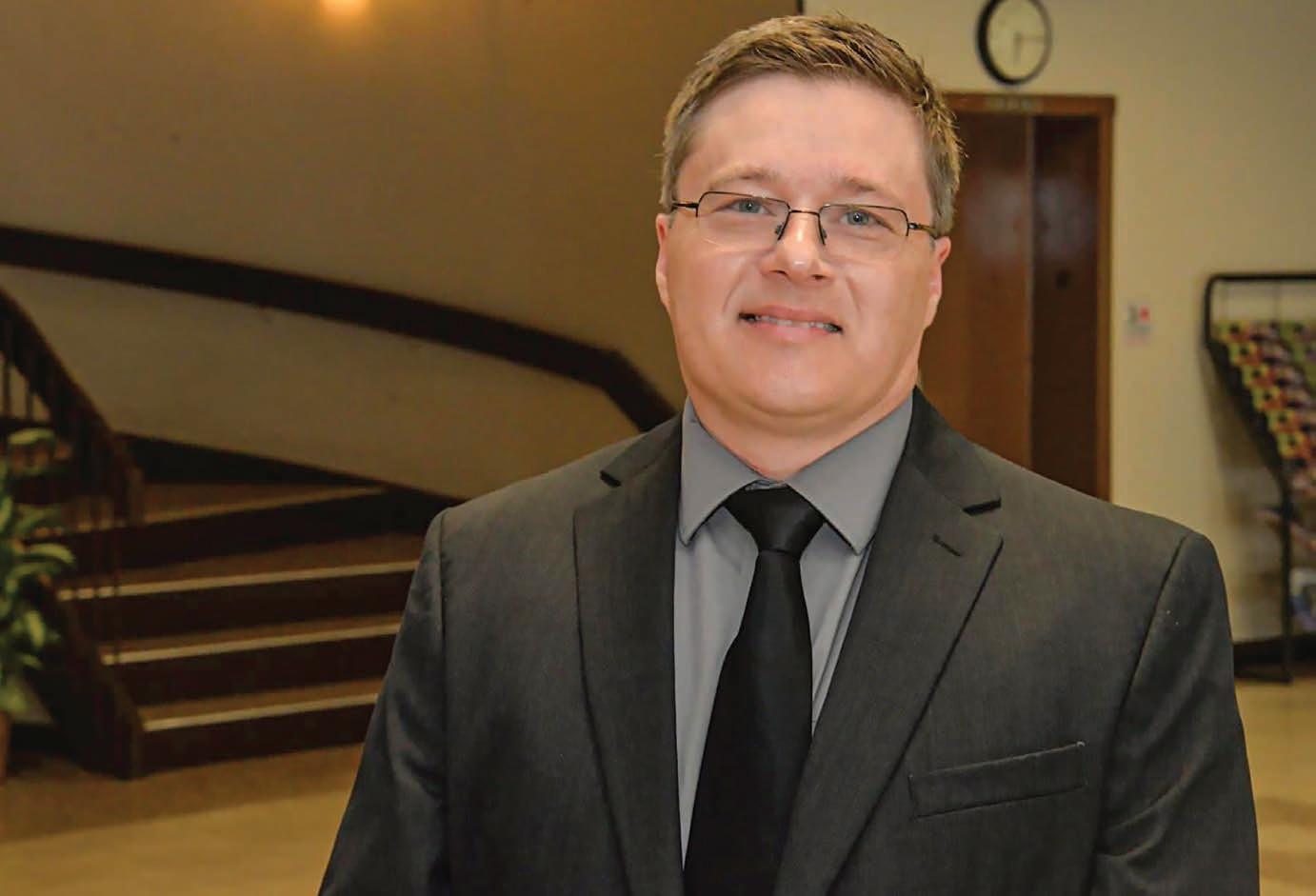
Even as an elementary school kid, Chris Cable hated school. It felt pointless, and so boring that he struggled to stay awake. Cable wanted to be a state trooper when he grew up — why did he need to know about algebra and essay-writing?
So he snoozed through high school, skating by with report cards full of Cs and B-minuses. In geometry class, his inattention left him irretrievably lost. Instead of seeking help, he just gave up.
“After half the year was up, I got out of that class,” he said. “That was me when I was in high school. If I didn’t understand something, I wouldn’t go the extra mile to learn how to do it.”
Most guys Cable knew had a similar attitude. School bored them, and their main goal for their education was to end it. A few of his friends even quit early, dropping out at 16 to help with the family business or claim a full-time job.
But the girls were different.
“The girls, they were the ones that excelled,” said Cable. “And the guys did not.”
Cable graduated from Swain County High School in 1989, 10 years into a trend that had been sharpening since 1979 — when, for the first time ever, the number of young women
enrolled in higher education surpassed the number of young men. In 1972, when Title IX of the Civil Rights Act was signed into law, prohibiting sex-based discrimination in higher education, only 43.2% of 18-to-24-year-old higher education students were female. By 1979, females formed the majority, at 50.9%. When Cable graduated high school, 54.3% of 18-24year-old students were female.
For a short time, Cable counted himself among the male minority of higher education students, enrolling in Southwestern Community College’s criminal justice program. But he kept his full-time job, working 3 to 11:30 p.m. after attending school 8 a.m. to 2:30 p.m., five days a week.
“I didn’t have time to study,” he said. “I didn’t have time to work on my stuff, and I ended up getting on academic probation because of my grades. I just decided at that time school wasn’t important to me as what making money was. So I quit school and kept my job.”
Cable’s story is a common one. The world has changed since 1989, but the trend of male underrepresentation in higher education is no relic of the past. In the 2021-22 school year, only 41.5% of students enrolled at Title IX institutions — colleges and universities that accept federal funding — were male.
“The gap continues to widen nationwide, and I think it continues to get attention, but interestingly nothing is really being done about it,” said Jim Shelley, who for the last 26 years has managed the Men’s Resource Center at Lakeland Community College in Ohio, one of the few colleges in the nation to host such a center.
This national trend is playing out at colleges and universities across the country, including Western North Carolina. In fall 2022, only 41.2% of Western Carolina University students were male, slightly higher than the 40.8% recorded across the University of North Carolina System.
Among graduate students, the disparity is even sharper. At WCU, fewer than 1 in 3 — just 31.4% — of fall 2022 masters and doctoral students were male. Systemwide, that figure was 37.8%.
A similar gap exists at community colleges, with fall 2021 numbers showing that only 37% of students at Southwestern Community College enrolled in curriculum programs aimed at helping them start a new career were male, and only 35% of that population at Haywood Community College, on par with the 38% of such students enrolled across the state’s community college system. However, males do comprise a majority in community college workforce continuing education programs, which offer accelerated workforce training that typically lasts about three months and culminates with a certifi-
cate. In fall 2022 they made up 59% of that population across the community college system, and 65% at both SCC and HCC.
Even if they do enroll in college, male students are less likely to graduate than their female counterparts. At WCU, the average four-year graduation rate for students starting a degree between fall 2015 and fall 2018 was 35.6% for men and 48.8% for women. By graduation, the chasm has split wide open — but it starts breaking apart years before students even think about filling out a college application.
State testing results show a gap between male and female academic achievement as early as third grade. In 2020-21 state tests, only 43.1% of male third graders tested proficient in reading, compared to 47.2% of females. In 2018-19, the last full school year before the pandemic disrupted education, overall proficiency scores were higher but the 4-point gap between male and female achievement remained.
In 2020-21, third-grade boys did edge out their female peers in math, with 2.2% more of them testing proficient, but in pre-pandemic testing years it was female students who held the advantage — an advantage they maintained for the rest of their K-12 career. In both 2020-21 and 2018-19, more female students than males tested proficient in all four high school classes with end-of-course tests — biology, English II, math I and math III.
Boys are excelling at lower rates, and, as in college, they’re also graduating at lower rates. Statewide, 83.4% of male students who started high school in the 2018-19 school year had graduated by spring 2022, compared to 89% of females. High schools in Haywood, Macon and Jackson counties all have similar gaps in graduation rates. The only exception is Swain County, where the female graduation rate eclipsed the male rate by just 0.1%.
Male students do have higher numbers than females in two areas: dropouts and expulsions. In 2020-21, 63.3% of North Carolina’s high school dropouts were male. Of the 199 students who faced short-term expulsion in Haywood, Jackson, Swain or Macon county schools in 2020-21, 68.3% were male.
and policymakers still focused on correcting what had until very recently been a system that deliberately roadblocked female achievement. Today, the gender gap is wider than it was at Title IX’s passage in 1972 — but in the opposite direction.
Educational and political leaders are starting to talk about how to help men and boys achieve their potential, and journalists are reporting on the issue, with extensive stories appearing in in The Wall Street Journal in September 2021 and in The Chronicle of Higher Education in December 2021.
There’s a growing recognition that the situation is urgent. Male students are falling behind, disengaging from school as boys and turning their backs on higher education as men.
Conversely, only six of the 19 students in the top 10% of Smoky Mountain High School’s class of 2022 were male. Perhaps it’s no surprise that by the time college admissions season starts, fewer men than women seek a spot. In fall 2022, just 39.8% of WCU’s first-year applicants were male.

“We’re reviewing a disproportionate number of females even at the point of application,” said Phil Cauley, associate vice chancellor of undergraduate enrollment at WCU. “So, it’s not where you’re starting with a 5050. Our difference is somewhat reflective of what we’re seeing all the way in middle school, high school and the feeders that feed our enrollment.”
For years, the growing gender gap in education flew under the radar, with educators
“It’s distressing,” said UNC President Peter Hans. “On one hand, you have encouraging news about female students going forward, pursuing their education successfully. And on the other hand, male students who, for whatever reason, don’t believe post-secondary education is right for them.”
“Hopefully it’s a wakeup call for folks that we do something collectively to really help make sure that men, as well as our women, are getting that post-secondary education that they need,” said WCU Chancellor Kelli Brown.
Neither Hans nor Brown is arguing that a four-year college degree is right for everyone. To the contrary, recent years have brought widespread acknowledgement of the importance of trade work, and of the high income opportunity and low school debt such pathways offer. But the men who are opting out of college are not flocking to these jobs, which are now seeing a critical shortage of applicants for needed positions. Young men’s flagging interest in education of all types is concerning, Hans and Brown say, and indicates a
When Title IX of the Civil Rights Act passed in 1972, women quickly eclipsed men in total enrollment at schools receiving federal funding. Data comes from the National Center for Education Statistics, with totals for 1970 through 1990 reflecting for students ages 18-24 only. SMN graphic
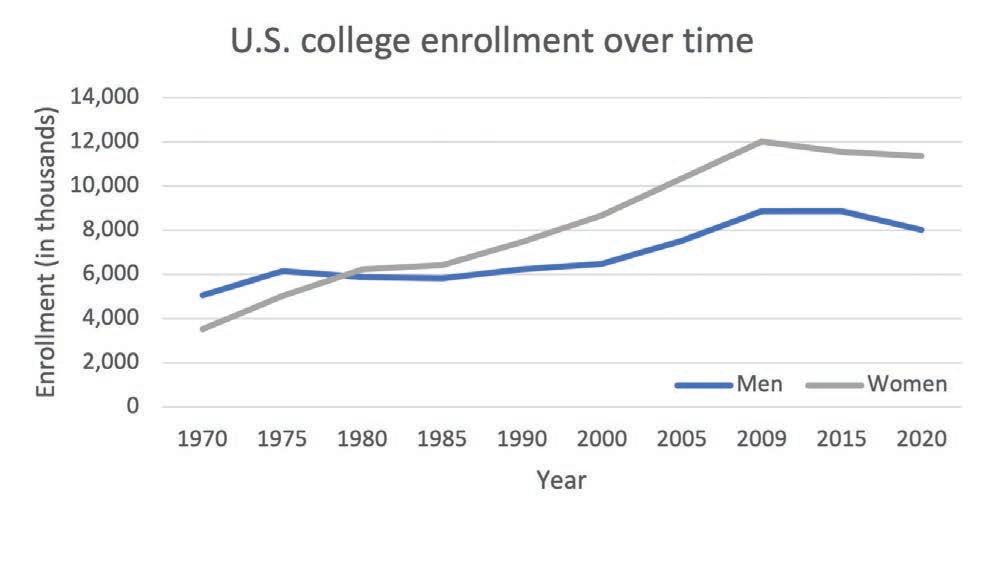
“The gap continues to widen nationwide, and I think it continues to get attention, but interestingly nothing is really being done about it.”
— Jim Shelley, Men’s Resource Center at Lakeland Community College in Ohio
leak somewhere in the pipeline between kindergarten and adulthood that’s preventing them from reaching their full potential.
Identifying the root of the problem is no easy task. Bruce Henderson, a retired WCU psychology professor, believes that academic underperformance from men is “due to a whole bunch of little things, not one big one.”

“There’s a lot of speculation, I think, locally, nationally on that,” said Thom Brooks, executive vice president for instruction and student services at SCC, adding, “You know, I don’t think anyone has the exact answer.”
Shelley would agree that there’s not one answer. In a 2017 article for “New Male Studies: An International Journal,” he lists ten.
Lack of early success in school fueled by differences in male and female brain development — and by what Shelley terms “boy behavior” that is often at odds with classroom management goals — is likely a factor.
“Developmentally, [boys] lag behind girls in terms of developing literacy skills,” Shelley said. “In kindergarten, girls are already about a year or so ahead. That gap continues throughout.”
Dr. Dana Ayers is now superintendent of Jackson County Public Schools but has seen the developmental differences in boys and girls firsthand during a 24-year education career that included positions as a classroom teacher for first, fourth, fifth and six grades, then later as a middle school administrator.

“I taught sixth grade, so we did algebra, and while oftentimes females could just write it out, males would need a visual or pictorial or a manipulative to do that,” she said. “And I think that goes along with the maturity rate.”
Biological differences in development can lead to even bigger achievement gaps as young boys internalize the idea that they’re not good at school and won’t ever be, Shelley said.
“They don’t want to be a benchwarmer,” he said. “So, they already realize that they’re not really doing well at literacy, and that already sets up a discouragement with teachers and books, the learning process.”
Shelley also argues that greater emphasis in state proficiency tests and an associated decrease in recess time over recent decades has hurt male achievement. According to the EAB, formerly known as the Educational Advisory Board, average weekly recess time in the United States has fallen 60 minutes since 2001, with elementary school students receiving only 25 minutes of daily recess in 2019.
Young boys generally have a harder time sitting still all day than their female classmates. Physical activity can boost learning and helps control the symptoms of ADHD — Centers for Disease Control data show that boys are more than twice as likely as girls to be diagnosed with the disorder.
Tristin Goode, a 2021 graduate of Jackson County Early College, said that he felt those challenges keenly as an elementary school boy. His teachers thought he was hyperactive and unfocused. His doctor prescribed him medication for ADHD. Goode absorbed the impression that “there was this expectation that men were not as good.”
“Little boys, they act differently than girls,” he said. “The girls are usually more well-behaved. They try a little harder.”
The standards, he felt, were lower for male students. He saw his female classmates being encouraged to join a barrier-breaking generation of female achievement, but no similar inspiration was dangled before the boys.
Goode, like boys across the country, also had fewer role models in the classroom than his female classmates. According to the National Center for Education Statistics, in the 2017-18 school year 76% of all public school teachers were female. The percentage was highest for elementary school teachers, who were 89% female, while 64% of middle and high school teachers were women.
School counseling centers have the same issue. The American School Counselor Association says that in 2018, 85% of its members were female. Research shows that matched-gender pairs tend to work better for services like counseling, putting boys at a disadvantage when seeking help from the school counselor.
“I think sometimes because I am a female,
it takes longer for some male students to open up,” said Paige Jeleniewski, a counselor at Smoky Mountain High School. “Sometimes male students are more comfortable with a male.”
Goode is now a junior political science student at WCU, completing his degree online while working fulltime as a congressional staffer in Washington, D.C. Jackson County Schools sees him as a success story, and Goode is happy with where he is. But getting there, he said, required intrinsic motivation to keep his standards high and overcome stereotypes he perceived as a young boy.
“Pushing myself harder because of that perceived lack of capability or manners or anything like that that was kind of present all around me pushed me a little bit harder than it would have pushed other people, maybe,” he said.
Often, men falter in school simply because they don’t think straight A’s will do them much good in real life.
Goode reflected on the difference between his thoughts on education and those of his grandmother, who came of age in the 1970s when female educational opportunities were more limited. She worked hard to get through college and reiterated to her grandson the importance of having a diploma to hang on the wall.
“For her it’s more or less the value of just
getting the degree itself. That’s where the value comes from,” he said. “I definitely think that’s partially to do with the fact that she grew up in that second-wave feminist era where you get it not just to get the degree but also to prove that you are capable of it. I think that still rings true today in some respect.”
Shelley said he’s seen the same thing among the women at his college — and an opposing perspective among the men.
“If they’re going to commit to education, especially at the community college level, they really want to know what it will lead to, what will be gained,” he said. “I think a lot of colleges — perhaps a lot of high schools — don’t really do an adequate job in helping students with the career decision-making process.”
That resonates with Franklin resident Stephen Moore. A Canton native, he enrolled at N.C. State after graduating from Pisgah
High School in 1990. Though school bored him, Moore was a smart kid who took advanced classes and knew he was expected to go to college. But he lacked focus, and study skills. In high school he’d always been able to pass without homework or study. That didn’t fly in college.
“Having never left my hometown in my entire life, I basically, at 18 years old, showed up in Raleigh, North Carolina, and found a lot of different things I would rather do than go to class,” Moore said.

After two years and three changes in major, he flunked out. Moore spent a year at A-B Tech before deciding that he’d had enough of school. He got a job at a label factory and spent the subsequent decades hopping from one employer to the next.
“I like to say I squandered my higher education,” he said.

Now Moore knows that the problem was all about motivation. At 18, he didn’t know what he wanted to do with his life and didn’t see how a college degree figured into his future. He thinks he may have had undiagnosed ADHD — his broad array of interests often distracted him from the task at hand.
But in 2019, for the first time in his life, Moore found something that could hold his attention. He got into woodworking and started making pens.



“I got to the point in making these pens that I was like, ‘I love doing this so much. I wonder if I could do this for a living?’” he said.
That thought led Moore to enroll in SCC’s online business administration degree pro-





gram, and he approached his studies with an enthusiasm he’d never had at N.C. State or AB Tech. In December, he graduated with a 3.9.
It’s a story arc that echoes Cable’s, the Swain County grad who dropped out of SCC two decades ago. Cable rose “pretty high” with the injection molding company where he worked for 24 years after high school, but he lost his job in the pandemic. Not wanting to uproot his family to find a new job, he went back to school and left SCC with a business administration degree and a 4.0 GPA. Now he’s a property appraiser for Cherokee County.
“It was really a good feeling that I was able to go through that and do as well as I did,” he said. “It was a feeling that I’d never had before.”
In his book “Of Boys and Men: Why the Modern Male is Struggling, Why it Matters, and What to do About it,” Richard Reeves, a
senior fellow at the Brookings Institution, argues that the feminist movement’s success in taking the brakes off women’s achievement revealed an education system inadvertently structured in favor of girls.
“Once the brakes come off, girls just blew past,” he said in an interview for the podcast Plain English with Derek Thompson. “Their natural advantage in the system could only become apparent when they started going to college.”
Henderson takes issue with the argument that schools are biased against boys.
“Girls tend to succeed better in school because they are more tolerant of the way it is,” he said.
The role of interests does not tend to be given enough weight in education, Henderson said. Students learn better when they’re interested in the material, and less well when, like Cable, they’re sleeping through high school geometry.
Superintendent Ayers said that hands-on career and technical education classes are making a comeback in public high schools, with Smoky Mountain High School offering 54 such courses catering to specific student interests. Still, much of core education revolves around literacy, and research has long shown that on average girls enjoy reading more than boys.
“Students who enjoy reading would probably perform better in school on those reading assessments, and enjoy school,” Ayers said. “And oftentimes, those are female students. “
The problem continues in college, where a typical four-year plan frontloads general education classes that have little to do with a student’s chosen field.
“If you take your classes with outstanding teachers, those years can be great,” Henderson said. “Too often, however, gen ed courses, for many reasons, do not capture the interest of students. That puts those students with good study habits, a history of academic achievement, mature brains with better inhibitory and executive functions
and more intrinsic interest (i.e., females) at an advantage.”
Athletics can play a vital role in keeping students engaged in school even when they’re not particularly interested in what they’re learning. For both high school and college athletes, staying eligible to play in Friday night’s game can be a great motivator to maintain that 3.0 GPA.
“It absolutely provides an incentive for them to try in college,” said WCU Athletic Director Alex Gary. “It provides incentive for them to try in high school.”
Gary knows this to be true, because he’s walked in their shoes. A star baseball player in high school, he was an outfielder on the WCU team from 2001 to 2004, in 2004 earning Southern Conference Player of the Week honors before rounding out his college career at Virginia Commonwealth University. He returned to his alma mater as athletic director in 2020 and is charged with the academic and athletic success of WCU’s 400 studentathletes. Gary is passionate about what he does — he says athletic programs offer a pathway to college for students who other-
wise wouldn’t have one, and give students who might otherwise struggle a reason to excel academically. WCU has a high proportion of first-generation students, and in athletics that percentage is even higher.
“Many of our student athletes, and many athletes around the country, would not go to college if they didn’t have an opportunity to play baseball or golf or basketball or whatever the case may be,” Gary said. “They just wouldn’t.”
Competitive sports are important for both men and women, but there’s evidence to suggest that men are more predisposed to value them. In a 2012 study published in the journal PLOS One, authors conducted three studies to investigate the difference in male and female interest in sports. Results showed that, across age groups, females were equally likely to participate in exercise but far less likely than males to register for intramural sports at colleges and universities, play team or individual sports at observed public parks or to report team sport participation in a survey.
“Whether measuring duration or frequen-
cy, these studies consistently find that males play sports, especially team sports, at least twice as much females do, and often much more frequently,” the study says.
However, men — especially men who are not football players — have fewer opportunities to compete athletically at the college level than they did prior to the passage of Title IX, the law that removed institutionalized sexbased discrimination in education and allowed female students to start reaching their full potential. Under the law, school athletic programs must offer opportunities for male and female students in keeping with the gender ratio for that school. As it did for education in general, the law worked wonders for female athletic opportunity, which previously was often nonexistent.
Still, the law had some unintended consequences. Athletic programs cost money, and resources are limited. Complying with Title IX meant adding new programs for women, which required cutting existing programs for men — such as soccer and tennis, intercollegiate programs that WCU lacks to this day.
Of WCU’s roughly 400 student-athletes, about 100 play football. WCU is now nearly 60% female, which leaves few options for male athletes in other sports. Outside of rowing, there’s simply no female equivalent to football’s roster size.
“At a school like ours, we’re not going to have a rowing program; we can’t afford it,” Gary said. “So, we try to do the best we can to provide opportunities and stay in compliance with Title IX. And we are, 100%. We have had individuals suggest, ‘Why don’t you do this? Why don’t you do that? Why don’t you bring back men’s soccer?’ It’s like, well, we can’t.”
In 2019, Gary’s predecessor, Randy Eaton, asked the Board of Trustees to approve pursuing a feasibility study for starting a wrestling team at WCU. Wrestling is a popular sport at high schools across Western North Carolina, and Eaton thought it could help bring more first-generation students to Western. The pandemic’s arrival sidelined that discussion, but even in early conversations the Board of Trustees was concerned that Title IX considerations would be a barrier.

“You have to keep that lens of Title IX on everything,” Gary said, adding that finances also limit athletic opportunities. Most sports cost more money than they bring in, and athletic programs don’t receive state funding.
There’s no dispute that prior to Title IX, girls and women had, as stated in the PLOS One study, “vastly inferior” athletic opportunities. Change was certainly needed, and Title IX has had many positive effects.
“Nevertheless, our results do suggest that it may be a mistake to base Title IX implementation on the assumption that males and females have, or soon will have, generally equal sports interest,” the study’s authors conclude.
Nationwide, male college attendance has been declining for a decade in both absolute numbers and as a percentage of total enrollment. The Coronavirus Pandemic only exacerbated the issue, slashing male college enrollment while exacting a milder impact on
“Many of our student athletes, and many athletes around the country, would not go to college if they didn’t have an opportunity to play baseball or golf or basketball or whatever the case may be. They just wouldn’t.”
— WCU Athletic Director Alex Gary
Tristin Goode, 20, found motivation in college by pairing his studies with full-time work in his field. Donated photo

female enrollment. Enrollment at Title IX institutions in the U.S. fell by nearly 1 million between the 2019-20 and 2021-22 school years, with 2021-22 enrollment 4.8% lower than 2019 levels. The number of male students dropped by nearly 600,000 — 61% of the total reduction.

A similar pattern played out at WCU. The university enrolled 532 fewer students in fall 2022 than it did in fall 2019, a 4.4% drop. The male population absorbed 90.1% of that plunge, with 483 fewer male students enrolled in fall 2022 than had been the case in fall 2019.
At Southwestern Community College, total enrollment of curriculum students fell by only 49 between 2019-20 and 2021-22 — yet the number of men enrolled in such programs plummeted by 71 during the same period. Female enrollment rose by 22. Brooks, the college’s executive vice president for instruction and student services, said that while there are no firm answers as to why, there’s speculation that the rise of online learning accompanying the pandemic simply didn’t work well for some men, especially those entering traditionally male applied

technology fields.


“Many of the traditional fields that our male students are going into, some of the more applied technology fields, just don’t lend themselves well to online learning,” Brooks said. “It was a separation from that preferred route of learning for some of our male students, which gave them a reason to stop out and pause and haven’t come back since.”
In spring 2020, distance learning wasn’t just for colleges. Students from kindergarten through 12th grade were asked to attend class through a screen. At Smoky Mountain High School, for example, the school building was closed through the end of the 2019-20 academic year, and throughout the 2020-21 year students attended in-person classes for only part of the week. That break from the daily routine led some students to demote the importance of school in their lives.
“We had to work really hard to get students to graduation,” Jeleniewski said. “The view of what high school means has shifted.”
Many took on full-time jobs during the pandemic, gawking at the paychecks they received in return. When school returned to a five-days-a-week schedule, they could no longer balance academics and full-time work. Jeleniewski said students would sit in her office and say they no longer cared about class because they were already making money. School leadership had to reach out to employers and tell them that success in school must come first for teenage workers.
“Across the board, we’re finding students don’t want to be in school. But I would say there are more male students,” Jeleniewski said.
Since the pandemic, SMHS’s tally of early graduates has multiplied. The school used to have fewer than 10 early graduates each year, but in the 2021-22 school year there were 44. Nearly two-thirds were male.
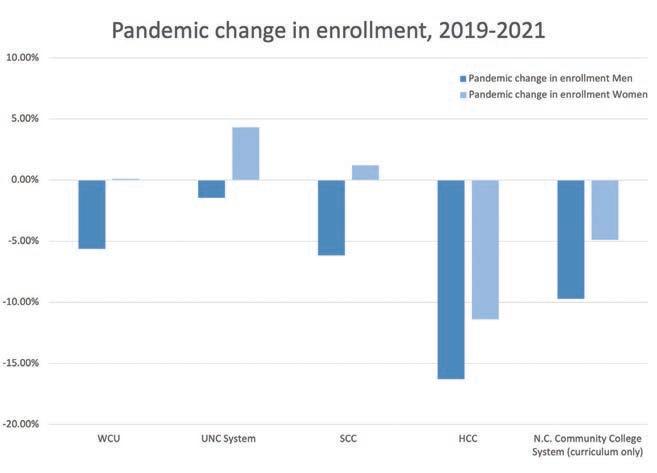






For many students, the question of whether to seek a college education boils down to economics. Unlike his grandmother, Goode sees college as a means to an end — the end being a fulfilling career that pays well enough to support a family.

“As someone who was raised in a more conservative household, that’s a little bit more centered around one day raising a family, having kids, things like that; men have to make the decision of, OK, I need to have a job to provide for my family. Do I need an education to do that, or can I just take what I already have and build off of work experience?” he said.
Goode was finishing up his junior year of high school when the pandemic set in, and for a while he gave up on the idea of college altogether. He took a welding class, liked it, and figured he’d rather have a career working with his hands than monitoring a virtual classroom, worrying about which assignments are due next week. He changed course after realizing a career in civics and politics would fit his interests and allow him to earn a living. Goode enrolled at WCU and was one of two students selected for a summer internship on Capitol Hill. That led to a full-time job, which he works while completing his degree online.
As a result, he’ll graduate with money, work experience, and a mute setting for the nagging voice in his head that insists any man — or boy approaching manhood — must have a job.
“Not having money, not having a job is really, really bad,” Goode said. “Like, you are looked down upon in a big way. Even if you are doing college full-time, people will look down on you because you’re not working.”
Noah Pressler, 21, has found a similar equilibrium in the distance learning opportunities available in the post-pandemic world.
He always knew he wanted to be a firefighter, viewing a college degree as a fallback should he get injured on the job. Pressler wasn’t planning to start fulltime work in college, but when a paid job came open at the fire department where he volunteered, he took it.

“It’s what I wanted to do, so I might as well take the opportunity while I had it,” he said. “And then I just went ahead and switched all my classes to online.”
For a hands-on learner like Pressler, online school is hard. He credits his success in K-12 to his elementary years at Summit Charter School in Cashiers, which he describes as a “big outdoors learning type school” where instruction involved plenty of field trips and hands-on learning. A lot of his friends in public school hated going to class, but he “really didn’t mind it.”
The learning style at Blue Ridge Early College, where he attended high school, was “definitely different,” he said, but by his teen years he was ready to cope, and he loved the extracurriculars. Pressler played sports yearround — soccer, basketball, baseball and golf — still graduating with a 3.8 GPA.
“Staying busy is big to me, because if I stall and decide not to do anything for a while, that’s when I get antsy and lose focus,” he said.
Losing focus is even easier when learning through a computer rather than in a classroom, and Pressler isn’t great at meshing academics with daily life. When he’s home, he likes to work on his boat or go fishing — school’s not on his mind.
“I find myself putting off work till the last
minute sometimes now,” he said in an interview during the fall semester.
The fire department job helped keep him disciplined.
“We have downtime at night, so that gives me a good chance because I have nothing else to do but for work on schoolwork,” he said. “That’s really honestly helped a ton. Yeah, we
work 48 hours straight on our shift, but of those 48 hours I’ve got almost 20 of them to do schoolwork or do whatever else I want.”
He treats it as a mandatory study hall, and the arrangement has worked well. Pressler graduated in December with a degree in emergency and disaster management.

“It’s a lot of time and effort,” he said. “But it all comes down to how bad do you want to do it?”
It’s clear there’s a problem. But what’s not clear is how to fix it. When political will gathered to address female underachievement in the 1970s, it was pretty obvious what had to be done — give women and girls the same access to academic resources afforded men and boys.
The root of today’s problem is different. Fixing it is not about expanding men’s rights. Rather, it’s about figuring out how to help boys and men claim the educational rights they already have.
“It’s going to take a whole bunch of initia-
tives and activities, not just one,” said Chancellor Brown.
In his book, Reeves makes a proposal for a sweeping reform aimed at leveling a playing field currently tilted by the differing development rates of girls and boys. Reeves believes that the default age for boys to start kindergarten should be a year later than the default age for girls, with boys receiving an extra year of pre-K before starting elementary school. This would give them one more year to mature before entering the classroom — but, more importantly, would ensure they’re a year older when they reach middle and high school, when the developmental gap is largest and the stakes highest.
“Would a delayed start for boys narrow the gender gap? I don’t know for sure,” Reeves wrote. “Such a significant change in education policy is hard to evaluate in advance. But the evidence of studies of redshirting makes me hopeful it could help quite a lot.”
Reeves wrote that a “raft of studies” show that redshirted boys are less hyperactive and more attentive in elementary school, with higher levels of life satisfaction, lower chances of being held back a grade and higher test scores.
Such a policy would be a novel shift from the status quo, but Ayers, the educator of 24 years who is now superintendent of Jackson County Schools, said it would be a good move. Recalling the year she spent teaching first grade, she said that overall the male students could have used more time to prepare for success in a school setting.
“I know to a non-educator that would sound crazy,” Ayers said. “Chronologically, they’re both the same age, but not physiologically. Because they haven’t matured.”
When asked her thoughts on Reeves’ proposal, Ayers said that she “definitely agrees” with it.


Henderson, the retired psychology professor, isn’t so sure. Academic redshirting might be useful for individual children, both boys and girls, but there are a host of factors for parents to consider when making that decision.

“I have recommended to parents that I have known that they consider holding out kids who face being the youngest in their class, but the decision is complex,” he said. “I would still argue that the most important thing is that children are in interesting, challenging environments where they have the opportunity to exercise their curiosity, interests and focused attention. Places where they can learn how to learn and how to think critically. And where they build meaningful relationships with teachers and peers. If they don’t have that, nothing else much matters.”
Goode wondered if redshirting could accentuate the problem, delivering a K-12 education to women a year earlier than men, but he liked the idea of starting school at an older age — for both genders. Meanwhile, Moore argued for more time on the other end of the K-12 pipeline.
“I would say go back to school at 25, 21, 23,” he said. “So don’t graduate out of school and go right back into school. Figure out what you want. Because you’ll be a lot happier if you did. I know I would have been.”
With only 11% of elementary school teachers being male, boys in public school are unlikely to have a male teacher until their teen years. Black boys — whose academic outcomes are on average worse than those of boys of all races — are even less likely to have a teacher who looks like them. While 13.6% of Americans are Black, the most recent National Teacher and Principal Survey finds that only 5.8% of teachers are.
Such statistics spurred creation of the Call Me MISTER program at Clemson University in 2000. The program, whose acronym stands for Mentors Instructing Students Toward Effective Role Models, aims to increase the pool of available male teachers of color in the country’s classrooms. Since 2013, it has resulted in a 40% increase in the number of Black male teachers in South Carolina public elementary schools.
WCU launched the program in 2020 and is the only North Carolina institution to offer it.

Brown said she loves the program, and the idea of graduates going back to teach in their old high schools, giving young boys a role model to look up to. That program, and others like it, can help make a dent in the problem.
Though Black men are even more dramat-

ically underrepresented in K-12 classrooms than men of other races, boys of all races have a dearth of role models in education — and WCU’s regional service area has a lower proportion of minority residents than the nation overall. Would it make sense to create more programs like Call Me MISTER, but open to recruits of all races?
“I think you could also take that, and you could extrapolate it into other programs,” said Brown. “It could be men and nursing, right, and so, how do you get more men into nursing? And it could be men in general.”

In his book, Reeves argues for a push to recruit men into “HEAL” professions — health, education, administration and literacy — mirroring ongoing efforts to interest more women in STEM jobs. While males as a group tend to have a higher level of interest in STEM subjects and females as a group tend to be more interested in HEAL subjects, there is significant overlap between those interest profiles, Reeves said. He argued that data indicate the dearth of men in HEAL jobs is not fully explained by differences in male and female interests.
“Just as the current underrepresentation of women in engineering or in leadership roles cannot be plausibly attributed to natural causes, it is equally absurd to think that the 18% male share of social workers is an authentic representation of the true level of interest in the job among men, especially since it’s half since 1980,” Reeves wrote. “If certain occupations are seen as no-go zones for men, their choices are constrained, just as much as for women in the reverse case.”


Shelley agrees, saying government support is needed for programs seeking to close the literacy gap between girls and boys, similar to efforts that began in the 1990s to close the math gap.
“We know that the world has become more verbal, and boys are losing out because of that,” he said.










Henderson argues that changes to how school is taught could drastically improve student success, for both genders. Currently, he said, education does not give enough weight to the role student interest plays in learning.
“If I were king, I would encourage educational approaches that use individual interests more, not gendered ones,” he said. “Curiosity and exploration drive intellectual development. They need a much stronger role in education.”
For younger children, this means more time outside, as well as different objects, challenging problems and more resources and books to explore. For older kids and teens, more ideas, books, experts to talk with, debates, independent study and time spent in real world environments would help them succeed.


“I would change schools to make them more interesting, to the advantage of everyone,” he said.
In a similar vein, Henderson would like to see a paradigm shift in college education. If he were to build a four-year curriculum, it would be frontloaded with courses that best

Western Carolina University alum Preston Blakely will be the keynote speaker for the Chancellor’s List Award Ceremony.

The event, celebrating students who made the chancellor’s list during the fall 2022 semester, will be 5 p.m. Tuesday, Feb. 7, in the Bardo Arts Center Performance Hall.
At 27, Blakely is the youngest mayor elected in Fletcher and the youngest serving mayor in North Carolina. His first year in office has been tracked and covered by news entities across the state, including WLOS, Blue Ridge Public Radio, Mountain Xpress, The Urban News, and the Citizen-Times. He was recently featured in the fall issue of WCU Magazine.
Blakely is well known to the Western Carolina University community as someone from a long lineage of local leaders who are future focused and community oriented. Upon graduating in 2019 from WCU with a master’s degree in public affairs, he was named “Outstanding Public Affairs Student in Public Management.” Blakely has now served his first year full as mayor, while also managing his family’s Asheville-based business, Quality Janitorial Group.
Blakely has consistently invested in his education and community presence with pride and purpose. At WCU, he was the graduate assistant in the Public Policy Institute. As part of his capstone project, he created performance metrics for the city of Hendersonville’s Public Works Department. As a resident of Fletcher, he has both volunteered and served on nonprofit boards. Now, as an elected official he hopes to inspire other young people in leadership and active citizenship.
Qualifications for Chancellor’s List Award:
Student must be an undergraduate.
Student must have achieved a 3.8 GPA or higher during the previous semester.
Student must have retained full-time status (12 credit hours or more) for the entire semester.
All students’ grades must have been finalized by the end of the term (no incompletes given).
Student recipients of the Chancellor’s List for fall 2022 semester will receive an RSVP email in December and January for the Chancellor’s List Award Ceremony in Spring 2023.
For more information on the Chancellor’s List visit transition.wcu.edu.
fit students’ interests, with some challenging general education courses saved for junior and senior year.
“That kind of curriculum would be better for all students, but especially males,” he said.
Brown said frontloading in-major classes more would be a “really good idea,” but pointed out it could cause complications for students who change their major early on. Academic clubs can provide some of those same advantages without penalizing students for changing their mind. Still, she acknowledged that students could benefit from earlier exposure to their major field.
“I think that we have to work harder at that, recognizing that for some students — and probably not just for males, probably students in general — they want to know, how’s this going to help me when I become a paramedic?” she said. “Or how’s this going to help me when I’m a physician, or a nurse, or a historian or an accountant?”
Cable said much the same when asked what could have helped him keep focus as a teenager at Swain High.
“If they had had at that time some sort of elective or a class that had to do with law enforcement or criminal justice or something like that and it would have went towards getting a degree or my schooling once I went to college, that might have inspired me to try harder,” he said.
Helping high schoolers see themselves as future college students is also part of the puzzle, Brown said. WCU’s partnership with Statesville High School through a program called Students to Teachers Through
Educator Pathways, or STEP, is part of that effort. Open to both boys and girls, the program lets high school students spend a week on campus, see what college is all about and hopefully leave inspired to find a way to make it happen for themselves.
“We need more of those kinds of programs,” Brown said.
Brooks said SCC is making similar efforts to get high school students on campus, both in large groups for events and for small group experiences. Programs like Upward Bound and New Century Scholars target first-generation college students as early as seventh grade, aiming to equip them for success as they continue their academic career.
He relayed a story from another SCC administrator who brought a small group of male high school students to campus, giving them a chance to look around, walk into labs and chat with students.

“Over the course of an hour or so on campus, he was amazed to see the change in their level of engagement and interest after they got here,” Brooks said.
However, as Cable’s and Moore’s experi-
ences show, enrolling in college is only half the battle. Graduating from it can be an entirely different animal, and males struggle there too.
“One of the beauties, I think, is that people are noticing there is a disparity and having additional programming to recognize that,” said William Moultrie, associate vice chancellor for student success at WCU.
Few colleges and universities have a men’s resource center like the one Shelley leads in Ohio. Outside of Call Me MISTER and Band of Brothers, a course on leadership and mas-
culinity, WCU doesn’t have any programs specifically targeted to men. Programs for “special populations” such as first-generation, low-income and racial groups include both men and women.
“When we touch on or when we plan initiatives and programming around special populations, we hit the men as well,” Moultrie said.
Moultrie is still new to the job, starting at Western in July 2022, and he said he’ll be cruising the data for insights into how best help Western students as he heads into the new academic year.
SCC is currently evaluating one such initiative following its participation in a national study funded by the U.S. Department of Education. The study examined the impact of success coaching, in which success coaches and advisors reach out to students showing signs of trouble and connect them to support services like tutoring or counseling. Overall, participating students showed only a 0.7% increase in credential completion, but male students showed a 2% increase. This was an encouraging result, but thus far SCC has not been able to replicate it.
“Research indicates often the male college student, particularly the community college male college student, may be more reluctant to ask for help, reach out for support and tutoring,” Brooks said. “And to the extent that that we kind of bring that to them when we notice problems, we’re more likely to connect them with the support that helps keep them here.”
The solution isn’t clear, but the stakes are. This problem challenges half the population’s ability to fulfill their full potential, whether by obtaining a four-year degree, completing a trade school program or simply graduating from high school.
“We can’t continue to let this happen,” Brown said. “We can’t continue to see our men not graduating from high school and/or not going off into post-secondary. It’s not good for society. It wouldn’t be good for their communities, and I think in the long run individually for them.”
For centuries, men and boys had a monopoly on access to education and choice careers. Now, everybody is allowed to dream — but too many men and boys are choosing not to.
“Hopefully it’s a wakeup call for folks that we do something collectively to really help make sure that men, as well as our women, are getting that post-secondary education that they need.”
— WCU Chancellor Kelli BrownA WCU student engages in hands-on learning during a lab class. WCU photo






































Bill Taylor, a former chairman and member of the Eastern Band of Cherokee Indians Tribal Council, pleaded guilty Monday, Jan. 9, in a case stemming from an Oct. 6 domestic dispute at his home in Cherokee.

The Jan. 9 court date had been intended for a trial that Taylor’s attorney Leo Phillips initially expected to take all day and spill into Jan. 10. However, after Judge Barbara “Sunshine” Parker opened the session Tribal Prosecutor Cody White announced that the parties had reached a resolution, and there would be no trial.
Taylor had faced four charges in connection with the incident: impaired driving, assault on a female domestic violence, assault with a deadly weapon and reckless endangerment. In accepting the guilty plea, Parker dismissed the two assault charges and found Taylor guilty of reckless endangerment and reckless driving, which is a less serious offence than the original impaired driving charge.
White said the impaired driving charge had to be reduced due to issues with evidence collection. The alcohol blood test wasn’t performed until the morning after the incident, and while there was “no question” about probable
cause for the offense, “potential chain of custody may have been an issue” and the prosecution’s ability to walk through that at trial was “questionable,” White said.
Parker sentenced Taylor to a suspended sentence of 90 days in prison and 12 months of supervised probation, also ordering him to complete a batterer assessment and wear a continuous alcohol monitoring device until he completes the Batterers Treatment Program. Taylor must pay $190 in court fees. He’ll avoid prison if he completes these requirements successfully.
Initial court documents alleged that Taylor, 51, had been harassing his wife by constantly texting her while drunk, culminating in a domestic dispute Oct. 6. When she attempted to flee in her vehicle, Taylor allegedly got in his truck and struck her vehicle with such force that it was disabled, including damage to the rear passenger bumper and tire. Taylor’s truck was damaged as well. The
collision allegedly jarred his wife’s body enough to cause physical harm. Afterward, court documents say, Taylor fled the scene. He resigned his Tribal Council seat later that month.
In court, Phillips said that the incident was a wake-up call for Taylor, who has sought help above and beyond court orders and lost about 70 pounds since he stopped drinking in October. Taylor has been to both individual and group therapy, attending and speaking at Alcoholics Anonymous groups around the area, attending 20 sessions of batterers treatment and participating in 13 substance abuse classes.
“Part of that is due to him and his wife working together,” Phillips said.
Phillips said that Taylor is “very sorry” for his actions and that his family has rallied around him, supporting his recovery and helping him get to various meetings and appointments. Despite what they’ve been through, Taylor and his wife are a “loving and bonded to one another” couple, Phillips said.
“He has a story that he wants to tell and will tell as he goes forward with his life,” Phillips said.
“I commend you on entering into treatment and getting the help that you need,” Parker told Taylor, adding that she hopes this is the last time she sees him in her courtroom.
The N.C. Division of Motor Vehicles routinely receives complaints from customers who have been targeted by scammers claiming to be representatives of either the DMV or the N.C. Department of Transportation.
Recently, several law enforcement agencies have reported that many unsuspecting DMV customers are receiving scam emails from a group claiming to be from the “Department of Transportation” and encouraging targeted individuals to click on a link to pay a fine for an alleged driving violation.
Customers are encouraged to be aware of any emails from an individual or individu-
als using the address “notice@penalty-govus” claiming to be from the Traffic Division of the Department of Transportation. The email includes a link to make a payment for a fine.
“DMV customers must remain vigilant as criminals try newer ways to defraud customers and steal their identities,” said DMV Commissioner Wayne Goodwin. “If you receive any unexpected email alleging you owe the DMV or the State money, then be very wary and contact the agency to verify the truth of the communication from an official telephone number or email address, but do not use the contact info one appearing in the email.”
To limit confusion when searching for bona fide DMV services and information, consumers should seek out the following:
■ Some websites exist that contain DMV information and forms, but they are not officially approved websites. Web searches may
return results with other websites, but only the official state DMV website ends in “.gov.”
■ Beware of third-party websites offering forms or other information that could be out-of-date or erroneous.
■ While not illegal, many of the sites are for profit and ask users to pay for forms.
■ Many sites exist to obtain your information for future marketing, or worse, for using your personal information in fraudulent activities.
■ If you provide payment information on a third-party website, beware that your payment card information may be stolen.
■ Check the “Terms and Conditions” page of the website, where the site states that it is not affiliated with any state government agency.
■ Always remember to look for a website that contains “.gov” in its address to assure you are receiving accurate governmental information.
Enrollment for 2023 health insurance through the ACA Marketplace ends Jan.
15. Folks who sign up now can have quality, affordable health insurance starting Feb. 1. Depending on household size and projected household income for 2023, individuals may qualify for premium tax credits that
lower the out-of-pocket premium costs. Many people can find plans with outof-pocket premiums that range from $50 to as low as $0 per month.
Need help sorting through all the options? Local, free, unbiased in-person assistance is available to explain options
and help with applying. Appointments are available in person or over the phone by calling Mountain Projects at 828.452.1447 or Pisgah Legal Services at 828.210.3404. This project is supported by the Kate B. Reynolds Charitable Trust and the Dogwood Health Foundation.
Whether it is routine maintenance, renovation, expansion or new construction, Macon County Schools has a long list of needed capital improvements. One of those projects is a step closer to completion after county commissioners approved a contract for architectural services earlier this month.
“The school board has identified this as their second priority only to the Franklin High School,” said County Manager Derek Rolland. “So, this is a top priority for the Macon County School Board.”
Highlands Middle School renovations have been identified and submitted in an application to the Department of Public Instruction where the project was approved and has a projected budget of $634,000. The scope of work will include a roof, HVAC system, window and flooring replacements.
Funding for the project will come from the North Carolina Repair and Renovation Fund, with no local money needed. The Public School Building Repair and Renovation Fund is part of the North Carolina Education Lottery from which all 115 school districts in North Carolina receive allocations each year.
“This is much needed,” said school board member Hillary Wilkes regarding the Highlands Middle School project.
A tentative schedule for the project aims to have bids received by April 30, contracts awarded by June, and construction completed by the end of July 2024.
This contract and design for Highlands Middle School repair and renovation is separate from the Highlands preschool renovation project. That project involves renovating high school classrooms to function as pre-K classrooms, renovating and expanding the media center and building additional high school classrooms to make up for those renovated into pre-K rooms. That project is estimated at around $4.8 million.
Highlands school currently has no preschool classrooms. The county serves about 90 preschool students annually, though it has 300 students in kindergarten each year. According to school board member Hillary Wilkes, private early childhood care and education centers in Highlands have yearslong waiting lists.
A separate project, though also at Highlands School, is the Highlands School soccer field. The field was installed about 14 years ago and faces major drainage issues that inhibit students’ ability to use the field for the majority of months in the school year. Because of excess water, the field is often frozen during the winter and early spring months and can be too muddy to play on safely during spring and fall.
Other necessary capital improvements in the school system include Nantahala School sewer treatment plant, Franklin High School, Macon Middle School sewer vent pipes, Cartoogechaye six-classroom addition and Macon Middle School track.

Grant Wahl, a well-known sportswriter, collapsed and died while reporting at the World Cup Soccer Tournament in Qatar. He was 48 years old. In the prior few days, he had shared that he had a cough and congestion, chest discomfort, and felt generally bad. Apparently there was a lot of that going around. He had sought care and seemed a bit better after taking antibiotics.
He had also written about the treatment of immigrant workers in Qatar and had been photographed wearing a shirt in support of LBGTQ rights, something he had long supported and a taboo in the culture of Qatar.
In the aftermath there were all sorts of theories on social media about his death. Was it COVID or COVID vaccine? Some mysterious Middle Eastern infectious disease — remember the MERS outbreak some years ago? Or had the Qatar government taken him out — remember Jamal Kashoggi and the Saudis?
As it turned out, Grant had an undetected, slowly developing, ascending aortic aneurysm that ruptured. All those theories were plausible, just not correct. But it’s not just Grant Wahl’s untimely death. We saw the same surrounding Demar Hamlin’s collapse during an NFL game and in the aftermath of the horrible murder of four college students in Idaho.
And this is how our minds work — connect the dots enough to form a plausible enough explanation, and believe in that explanation enough so we can decide how to act. Moreover, the brain is very good at justifying and defending that belief even in the face of information that suggests other-

To the Editor:
To crib part of a title from Phillip Longman’s book — “Best Care Anywhere: Why VA Health Care Would Work Better for Everyone” — this describes my recent experience at the VA Medical Center in Asheville.
I woke up Wednesday morning, Nov. 16, with intense stomach pain. At 2:30 a.m., I went to the local emergency room. A CT scan revealed that I had gall stones and needed surgery.
After a rough weekend, I called the Asheville VA on Monday morning. That afternoon a VA surgeon called me and scheduled an appointment for Tuesday morning. I completed pre-op that day, and Thursday morning, the 24th, I was on the operating table. The procedure was completed via laparoscopic surgery and I was discharged that day. My recovery has been quick and smooth. I needed pain medication for less than a week. I returned for a follow-up appointment on Dec. 6 and I was cleared to return to normal activity in a week.
I couldn’t be any happier with the care I received from the VA. The personnel there
wise. Science gives us a tool to better evaluate our beliefs, opinions and theories against the realities.
But we have seen throughout the pandemic the effect of preconceived notions presumably amplified and “justified” by correlation alone. Just because two things happen close to each other does not prove one caused the other. This does not mean it is not true; just correlation alone is not capable of proving that. Grant Wahl had upper respiratory like symptoms as did lots of people there. It was certainly possible he had caught some sort of bug, but that just isn’t what actually happened. Ivermectin, Hydroxychloroquine, Vitamin C, vaccine side effects, vaccines causing deaths, vaccines ineffectiveness — all possible, yet when studied in ways that get past mere correlation turn out not to be so.
Let’s take Ivermectin. Early on people observed that those who took this for COVID did not get sicker and concluded it was helpful. There were suggestions in other studies for the same. The problem was none of those studies were done in a way that made them capable of getting past correlation alone as the “proof.”
Now there has been a study designed in a way that provides the proper insight. ACTIV 6 enrolled 1,200 participants — half got ivermectin, half got placebo. Nobody knew who
responded immediately to my call, and everything was handled efficiently, promptly, and with real concern. This is the kind of care all Americans should receive. I went to the local emergency room because it was the middle of the night, and the VA is about a half-hour drive for us. Had I gone to the VA emergency room, I am certain the surgery would have been scheduled even sooner.
Rather than attempting to privatize the VA healthcare system, which will be a great disservice to those who have answered the call to duty, Congress should be seeing it as a model for healthcare for all Americans. Numerous studies clearly show that VA care is equal to and often better than private care, is more cost effective, and offers an integrated, holistic approach as opposed to the costly, fragmented, and inefficient private sector, which leaves so many Americans poorly served, if not served at all. If you support veterans and want to do something concrete to show that support, instead of thanking us for our service, go to the website Save Our VA / Veterans For Peace and join our campaign to stop the privatization of the VA healthcare system.
Bruce Carruthers Waynesvillegot which. The Ivermectin group got better in 11 days; the placebo group in 12. No difference. They tried a higher dose for longer among another 1,600 participants — no difference. Ivermectin was promising; just not helpful.
And here’s another thing about science. It took over two years to run this study. Science takes time. People want answers now, especially in the face of uncertainty and risk. That’s why our brains connect as many dots as possible in hope of acting effectively. It’s also why anchoring on that initial story is a problem; it might not be correct. Watching science evolve in real time means also being open to amending and adapting that story as more is learned, something our brains are hesitant to do, but will do, if it leads to a better explanation, one that helps make better decisions in how we lead our lives.
Unfortunately so many have and continue to form their belief, and then look around for just the information that supports that opinion, and then dismiss or not reconcile that which suggests otherwise. Judge for yourself whether someone claiming to know the “truth” is trapping you in correlation alone.
Science works by connecting the dots, generating a possible theory, but then not stopping there — taking that theory, testing it using methods capable of providing some insight, and adapting that theory based on what is learned. Science uses the data to form and test the theory — not the other way around. And that’s how science works to our advantage.
(Dr. Mark Jaben is the medical director for Haywood County Health and Human Services Department. jabenm@aol.com.)

January is an annoying month for many people. The hoopla and excitement of the holidays has ended. The weather is cold and dreary and for most there is little to look forward to, but for me, January is special because it’s when both of my boys were born.
As their mom, I revert to birthday planning mode as soon as the holidays end. But, this year unfolded a little differently. Just as I was beginning to plan their individual celebrations, life smacked us in the face.
On Monday, Jan. 9, Brooks was playing in a middle school basketball game. He looked like his normal athletic self on the court. That night he showed us what looked like an infected sore on his toe, like maybe a blister had burst. The following morning he felt soreness behind his knee. At first we thought maybe he’d torn a muscle during the basketball game, but that afternoon before practice, his coach called to say Brooks had a fever of 103.
From there transpired a week of stressful unknowns. I took him straight to the doctor from basketball practice and due to the unique combination of variables (high fever, pain in the back of the knee, sore on the toe, and absence of cold/flu symptoms), the doctor felt like the infection was bacterial in nature and prescribed an antibiotic.
That night, I slept in the room with him and his fever spiked to over 104. Even with fever reducer and ice cold washcloths on his body, it was challenging to get his fever down. The next morning a rash appeared on the back of his calf and behind his knee. With the high fever and rash, we went to Mercy Urgent Care. They drew blood and ordered an ultrasound.
The lab work indicated elevated white blood cells and elevated neutrophil levels, indicative of a bacterial infection. The ultra-
sound showed no blood clots or muscle tears but did show enlarged lymph nodes. The “rash” was now full-blown cellulitis.
Despite the fever getting better over the next several days, the cellulitis worsened, so on Friday we went back to the pediatrician and they sent us to Mission Hospital for an IV of antibiotics. The scary thing about these bacterial infections is they can turn systematic quickly. The doctors were trying to stay
well,” our nervous system immediately calms.
A couple days before Brooks’ fever spiked, I printed the words “All is well” and posted them on the wall behind my computer. Over the next couple of days while Brooks was home from school, I routinely stared at the words.
After the news about going to the hospital, I sat in my car crying and asked the universe for a sign that things would be OK, and I am not joking when I tell you what happened. The next song to come on Spotify was called “All is Well.” To my knowledge, I’d never heard the song before. When I saw those words on the screen, time stood still for a moment and I felt a rush of reassurance.
I also realized I was struggling because my mom passed away in the very hospital where Brooks would get the IV. Granted, both my boys were born in that hospital so it’s a bittersweet place, but the last time I’d been inside the hospital was when my mom died, so I’m sure there was some triggering going on that was contributing to my heightened emotions.
Along with these signs, friends and family were pouring love into us with texts, phone calls and offers to help in any way they could. When we’re struggling, we must rely on others to hold us up.

All these ooey gooey good vibes were happening but simultaneously I was worrying like a crazy person, searching phrases on the internet like “long-term effects of bacterial skin infections” and “What does pain with cellulitis mean?” and “can cellulitis cause deep tissue damage.”
Eventually I stopped myself and began scrolling through quotes on social media. One of the first ones to appear said, “Worry is a prayer for chaos,” also from Gabby Bernstein. This quote made me think about how sometimes we accidentally manifest negative feelings. What we focus on we create more of so by focusing on the worry and stress and the doomsday Google searches, I was subconsciously bringing more worry and stress into my life.
on top of it and we were so grateful for that.
Gabby Bernstein is a spiritual leader I follow, and one of her mantras is “All is well.” When things feel chaotic or stressful, if we can sit with our breath, trust that the universe has our back and say aloud “All is
My mom’s favorite bird was the hummingbird. Since she died, hummingbirds are my sign that she’s still with me. When we arrived at the pediatric unit of the hospital, you’ll never guess what was painted up and down the walls. Hummingbirds. I knew it was my mom telling us to trust and have faith that things would be OK.

As soon as I shifted my train of thought and started reading a novel, responding to a few mundane work emails, chatting with Brooks and the nurses and doctors, inhaling some essential oils and chilling out in the hospital recliner, I immediately felt better. Brooks is currently on the upswing, and we are beyond thankful. We’re still not 100% sure what type of bacteria started all of this or how it entered his body, but what I have learned is that panic is no way to manage this type of experience. As soon as I made myself relax and let in some light, I felt better. We are mere mortals, after all, and it’s times like this when I realize with great clarity why we often need to look beyond ourselves for faith and hope.
(Susanna Shetley is a writer, editor and digital marketing specialist. susanna.b@smokymountainnews.com.)

(Donated photo)
Luzene Hill’s “Revelate” will be at the Asheville Art Museum from Jan. 27 through May 15. Additionally, Hill has a piece in the group installation “Disruption,” located at the Museum of the Cherokee Indian in Cherokee, which will be showcased until Sept. 11.
For more information, click on luzenehill.com.
her grandparents and other family members together not talking, but sitting and listening to the world around them.
“I was struck by how much listening was done here,” Hill said. “Whether alone or amongst others, inside or outside, you’re sitting and listening — being aware and feeling comfortable in the not talking.”
Along with the mylar cape and sound recording, the installation is also accompanied by several drawings from another of Hill’s works called “Matrilineal.” These drawings illustrate matriarchal cultures before the introduction of patriarchy via colonialism.
Balance, rhythm, and equilibrium are all words that mean so much, yet we as a society struggle to grasp the essential part they play in our lives. In many native and indigenous cultures, the practice of balance remains a focal point in daily life, and it is regarded as one of the most important aspects of the community.
Luzene Hill of the Eastern Band of Cherokee Indians is an artist who wants to shine a light on this issue, using her striking performances and sculpted art to communicate her messages of native sovereignty and the treatment of native women — allowing the viewer to dive deeper into how indigenous cultures are heard and felt in these times.
Last week, I was able to have an engaging conversation with Hill, a woman whom I have found inspirational, and whose work I find compelling, especially her recent piece, “Revelate,” which will be installed at the Asheville Art Museum later this month.

Over the last few decades, Hill has produced varying works that have focused on trauma and violence against women, specifically indigenous women, and the heartbreaking statistics that the public has little to no knowledge of.
With this current exhibition, Hill touches on this topic by looking toward the root of the issue, the lack of balance and rhythm within our current culture. She employed the philosophy of Olin, the Nahuatl word for the natural rhythms of the universe, to verbally describe the message that she conveys through the piece. Integrated into this new work, similar to her other installations, she designed a cape
A recent work by Luzene Hill. (Donated photo)
Breaking down the mindset that equality is impossible between matriarchy and patriarchy allows us as a community to heal from generations of damage inflicted upon women in our current society. A community can heal once the acceptance and understanding are that both sides are complimenting opposites meant to uplift, take care of, and look after one another.
“This is emphasizing to non-native people that this was the way indigenous people moved through their lives,” Hill said, specifying the way the Cherokee people embraced the women in the community.
Women were a part of the decision-making, and heavily involved in all aspects of life, being regarded as equals and held in high regard, there was no violence, and no need to dominate and that foundation led the Cherokee people to be stronger as a whole.
I inquired how moving from Atlanta to the Qualla Boundary is inspiring her work and how it feels to create on her ancestral land.
“It makes me feel strong, but it also makes me feel that I am clear about who I am.
using mylar safety blanket material symbolizing the show of care and movement.


When creating the cape, she found the sound of the material had a unique rhythm to it, which then became another layer to the art representing the act of not talking, but listening. This scene is one that Hill herself has experienced. When visiting her family in the Qualla Boundary as a child, she would repeatedly find
Growing up biracial, my father was full-blooded Cherokee and my mother was white,” Hill said. “I felt neither ‘this’ nor ‘that,’ but coming back to the land and living here, I feel very supported just being in the presence of other Cherokee women. It feels wonderful. Doing this here and living here is more satisfying — I am more confident about the work I am doing.”
With this recent installation, Hill intends to present the work as women, notably native and indigenous women, being big and taking space, being equal but also being powerful and finding the balance within themselves.
“This is all about power, stability and balance of strength and asserting it — claiming it and really practicing it,” Hill said.

shoeboxes of moments placed carefully in the closet of my mind.
But, it’s wild to see how much ambition and determination I had back then, where I was willing to suffer as long and as hard as it would come to pass, just to find stability in my dream as a writer.

1The American Chinese Friendship Society of Western North Carolina and Folkmoot USA will present the “Lunar New Year Celebration,” which will be held from 7 to 9 p.m. Friday, Jan. 20, at the Folkmoot Friendship Center in Waynesville.
2The Scotsman (Waynesville) will host Ashley Heath (singersongwriter) at 8 p.m. Thursday, Jan. 19.
Live Music with Ashley Heath 8pm - 10pm - Blues/Rock

There’s an old backpack in my apartment. I’ve had it since college. And since those academic days back in Connecticut and greater New England, it’s held my road journals.
From fall 2006 through fall 2012, I wrote feverishly in numerous notebooks: in diners, at bars, along lonesome highways coast-tocoast, next to a roaring wood stove, amid the electric nature of a new romance, amid the eternal sadness of a breakup, and seemingly everything in-between.
Anyhow, I haven’t unzipped the backpack in years. Today, I was fiddling around looking for something in my downtown Waynesville apartment, and came across the backpack. I unzipped it and took a plunge into my trials and tribulations from the winter of 2009.
Back then, I was 24 and had just returned to my native North Country of Plattsburgh, New York, following the conclusion of the “Western Experiment,” where I spent the better part of a year (2008) as a rookie journalist as a small newspaper on the Idaho/Wyoming border in the Grand Teton Mountains.

It’s wild to reread who I was, what I was doing, and what I wanted to do back then. The fire within remains, its glow and heat as bright and vibrant as ever these days, thankfully. At that time, I was a struggling freelance writer, making $45 per article in my hometown newspaper, the Press-Republican.
I was also living for a period of time in an upstairs storage closet in my parents’ farmhouse. The quaint bedroom was isolated from the rest of the large house, a single window and bookshelves, the mattress taking up about half of the floor space. A record player and big stereo system. The single window just above my head, the old farmhouse glass shaking in the middle of the night from the high winds of an Arctic blast from north of the border in nearby Canada.
Anyhow, they say certain things find their way to you at just the right time: people, music, books, experiences, moments, etc. Well, rereading these notebooks, and serendipitously popping into me circa winter 2009 has been quite cathartic in this very moment.
Yes, I’m still as much of a hopeless romantic as that young kid back then. Journal entries of former femme fatales, women I couldn’t ever imagine living without then, who I haven’t thought of in many years. And yet, the memories shared with them remain vivid upon dusting off the

One of those 2009 entries spoke about having only $10 in my pocket, but there was enough gas left in my old GMC Sonoma to get to downtown Plattsburgh for cheap beer specials and good times with faces I haven’t seen or spoken to since I left Clinton County for Western North Carolina in July 2012. How I was barely scraping by to survive, and yet, I kept going.
journal entry from Garret, 2008. (Garret K. Woodward photo)
3Mountain Layers Brewing (Bryson City) will host Bird In Hand (Americana/indie) at 6 p.m. Friday, Jan. 20.
4Meadowlark Motel (Maggie Valley) will host Len Graham (singer-songwriter) at 6 p.m. Saturday, Jan. 21.
5Boojum Brewing (Waynesville) will host Smooth Goose (rock/jam) at 9 p.m. Saturday, Jan. 21.
Headache. Hangover. Sunshine pierces through the morning haze. Glowing box in corner blaring breaking news. Bear Sterns goes bankrupt. Who’s next to collapse in the financial world? Panic in the air. Paranoid views of the near future and beyond. Another Great Depression? What a time to quit my job. What a time to be unemployed. No health benefits. No job. Fingers crossed. Must buckle down and write novel.
Live Music with Lucy's Remains 9pm-12am - 90's Rock Cover Band

Private pre-fix Scottish four course meal alongside Scotch, Ale/Wine, Pipe Tunes and Poetry recital celebrating the immortal Scottish Poet/Lyricist Robert Burns. Tickets $ 59

Keep that in mind, I say to myself, when I think of “this, that, and the other,” and not take for granted I’m at a point in my career when I can go into any restaurant and order whatever I want off the menu. Bring on the filet mignon (medium rare) and a glass of your finest Oregon Pinot Noir — a far cry from those early days of eating generic Walmart spaghetti-o’s from a can in a Nevada truck stop, all while sipping on a lukewarm Milwaukee’s Best.

Oh, how the dream then was full-time salary employment in the realm of the written word, with the ultimate dream to someday write for Rolling Stone. Today, I remain a minimalist, and I live in a small apartment, a humble abode filled with shelves of books and vinyl records, a handful of guitars, and a porch view of the ancient Appalachian Mountains. Now? I’m entering my 11th year at the helm of the arts section for The Smoky Mountain News.
The bills are paid and I can do whatever I want to do, and also have been writing for Rolling Stone consistently since December 2018, a little more than a decade after I left the Grand Tetons, driving back east and trying to figure out how I could make this writing thing work out for me. The plunge into these journals continues, as rediscovered by this entry:
“(Sept. 15, 2008 – Cheap hotel room. East Dubuque, Illinois.)
Met up with my old friend Spicoli and his girlfriend, Mary, at the Pines Lounge just outside of Gary, Indiana. I hadn’t seen him since he left Idaho those many months ago. He was a lonely face I last witnessed in a cold bus stop, his presence getting smaller and smaller as my truck pulled away. I was heading east (Plattsburgh, New York). They were heading west (Portland, Oregon). And here the paths cross in rundown Indiana.
Happy hour Pabst Blue Ribbon. A few pool games in the lounge with the locals. Cigarette smoke swirled in the squeaky ceiling fans. Glass bottles clinked and clanked in celebration of the unknown night, unknown adventures, ready to surprise at any moment, around any corner. We were prying the oyster open. We were determined to exploit and dance in the possibilities of irresponsible enlightenment.
Camped out near the sand dunes. Feet in sand, drink in hand. Looking southwest, the Chicago skyline shone brightly. Millions milling about. This trio sits alone. Summersaults down the dunes. Laughter. Darkness save the glowing fire on the tip of my Camel unfiltered. He kisses her neck, holds her tight. I watch and recall happier times with women who’ve broken my heart, whose hearts I’ve broken.
The joint rotated amongst us. Frolicking in the woods, we strolled along empty paths. Blinking lights from nearby radio towers twinkled above the tree line. Reminiscing of foggy western memories. Imagining the future of our own current endeavors.”
Life is beautiful, grasp for it, y’all.
‘Goin’ places that I’ve never been, seein’ things that I may never see again’A
Rising Asheville singer-songwriter Ashley Heath will perform at 8 p.m. Thursday, Jan. 19, at The Scotsman in Waynesville.

With a voice often described as “velvet soul,” Heath has been winning over the hearts of Americana music lovers since she gave up her barista apron in the spring of 2015. Currently on tour in support of her sophomore album, “Where Hope Never Dies,” Heath continues to deliver her signature blend of sultry blues and anthemic rock-n-roll arrangements.
Aside from appearances at MerleFest, Bonnaroo and Shakori Hills, Heath has also supported Donna The Buffalo, Del
McCoury Band, Anders Osborne, Shamarr Allen (of Galactic), and other staples on the scene.
Often compared to music influences Bonnie Raitt, Grace Potter and Susan Tedeschi, Heath still manages to find a voice all her own, and has been recognized across Southern Appalachia for her strong songwriting and vocal abilities, having made the WNCW Top 100 list and Mountain Xpress “Best Of” awards several years in a row.
The show is free and open to the public. 828.246.6292 or scotsmanpublic.com. For more on Heath, click on ashleyleeannheath.com.


Monday 4 p.m.-8 p.m. Friday 11 a.m.-5 p.m. Saturday 11 a.m.-8 p.m. Sunday 11 a.m.-5 p.m.

perfect for all walks of life, from families to golf groups to ladies who lunch. We pride ourselves on using fresh ingredients from our gardens and supporting local farmers. The details are priority.

Jackson County Americana/folk duo Bird in Hand will perform at 6 p.m. Friday, Jan. 20, at Mountain Layers Brewing Company in Bryson City.

The road less traveled has always been the way for husband-and-wife duo Bird in Hand. Bryan and Megan Thurman call the Great Smoky Mountains of Western North Carolina home and the region is directly reflected in their music. Bird in Hand is upbeat and new while still rooted in the tradi-
tions of American folk.
The two have played all over the Appalachian region, as well as across the country, and share an onstage chemistry that demands attention. They need to be seen live to understand the meaning of “Appalachian Thunder Folk.”
You can find their debut EP, “Due North,” online at birdinhandmusic.com. The show is free and open to the public.

mountainlayersbrewingcompany.com.
The Pic’ & Play Mountain Dulcimer Players will be resuming in-person jam sessions at the St. John’s Episcopal Church basement fellowship hall in Sylva.
The group welcomes all beginners and experienced dulcimer players, including mountain (lap) dulcimer and hammered dulcimer players. Songs played include traditional mountain tunes, hymns, and more modern music. The group meets at 1:30 p.m. on the second and fourth Saturday of every month in the basement of St. John’s.
Pic’ & Play has been playing together since 1995. The more experienced members welcome new players, help them navigate their instruments, and guide them through some of the basics of tuning, strumming, and playing.
The mountain dulcimer, also known as a fretted dulcimer or a lap dulcimer, is a uniquely American instrument. It evolved from the German scheitholz sometime in the early 1800s in Appalachia and was largely known only in this region until popularized more broadly in the 1950s.
For more information, call Kathy Jaqua at 828.349.3930 or Don Selzer at 828.293.0074.
• Altered Frequencies (Franklin) will host semi-regular live music on the weekends. 828.342.8014 or alteredfrequencies.net.
• Balsam Falls Brewing (Sylva) will host an open mic from 8 to 10 p.m. every Thursday. Free and open to the public. 828.631.1987 or balsamfallsbrewing.com.
• Blue Ridge Beer Hub (Waynesville) will host a semi-regular acoustic jam with the Main Street NoTones from 7 to 9 p.m. every first and third Thursday of the month. Free and open to the public. For more information, click on blueridgebeerhub.com.
• Boojum Brewing (Waynesville) will host karaoke at 8:30 p.m. on Wednesdays, trivia at 7 p.m. on Thursdays and Smooth Goose (rock/jam) Jan. 21. All shows begin at 9 p.m. unless otherwise noted. 828.246.0350 or boojumbrewing.com.
• Currahee Brewing (Franklin) will host Roscoe’s Roadshow 7 p.m. Jan. 21. Free and open to the public. 828.634.0078 or curraheebrew.com.
• Farm At Old Edwards (Highlands) will host the “Orchard Sessions” on select dates. Tickets start at $25 per person. For tickets, click on oldedwardshospitality.com/orchardsessions.
• Fontana Village Resort Wildwood Grill will host semi-regular live music on the weekends. Free and open to the public. 800.849.2258 or fontanavillage.com.
• Frog Level Brewing (Waynesville) will host Kevin Dolan & Paul Koptak (Americana) Jan. 21, Kind Clean Gentleman (rock/blues) 5:30 p.m. Jan. 26 and “Bottoms Up Fundraiser” with Ben & The Borrowed Band 11:30 a.m. Jan. 28. All shows begin at 6 p.m. unless otherwise noted. Free and open to the public unless otherwise noted. 828.454.5664 or froglevelbrewing.com.
• Frog Quarters (Franklin) will host semi-regular live music on the weekends. Free and open to the public. Located at 573 East Main St. littletennessee.org or 828.369.8488.
• Harrah’s Cherokee Casino Resort (Cherokee) will host semi-regular live music on the weekends. For a full schedule of events and/or to buy tickets, caesars.com/harrahs-cherokee.
• Innovation Brewing (Sylva) will host “Trivia Night with Kirk” from 7 to 9 p.m. every Tuesday, Open Mic Night every Wednesday, Andy Ferrell (singer-songwriter) Jan. 21, Adi The Monk (Americana) Jan. 27 and Rossdafareye (rock/country) Jan. 28. All shows begin at 7 p.m. unless otherwise noted. Free and open to the public. innovation-brewing.com.
• Innovation Station (Dillsboro) will host “Music Bingo” on Wednesdays and Divas On
Tap 8:30 p.m. Jan. 21. All events begin at 7 p.m. unless otherwise noted. Free and open to the public. innovation-brewing.com.
• Lazy Hiker Brewing (Franklin) will host “Music Bingo” 6 p.m. Tuesdays, trivia 6:30 p.m. Wednesdays, Open Mic 6:30 p.m. Thursdays and semi-regular live music on the weekends. All shows begin at 7 p.m. unless otherwise noted. Free and open to the public. 828.349.2337 or lazyhikerbrewing.com.
• Lazy Hiker Brewing (Sylva) will host trivia 6:30 p.m. Wednesdays, Old Time Jam 6:30 p.m. Thursdays and semi-regular live music on the weekends. All shows begin at 8 p.m. unless otherwise noted. Free and open to the public. 828.349.2337 or lazyhikerbrewing.com.
• Meadowlark Motel (Maggie Valley) will host Len Graham (singer-songwriter) 6 p.m. Jan. 21. Tickets are $10 for live music, $15 for barbecue dinner and a show. 828.926.1717 or meadowlarkmotel.com.
• Salty Dog’s Seafood & Grill (Maggie Valley) will host semi-regular live music on the weekends. Free and open to the public. 828.926.9105.
• Sauced (Waynesville) will host semi-regular live music on the weekends. Free and open to the public. 828.246.9585 or saucedwnc.com
• The Scotsman (Waynesville) will host Ashley Heath (singer-songwriter) Jan. 19, Lucy’s Remains (rock/oldies) Jan. 21, Andrew Wakefield (bluegrass/folk) Jan. 26 and Nick Mac & The Noise (blues/rock) 9 p.m. Jan. 27. All shows begin at 8 p.m. unless otherwise noted. Free and open to the public. 828.246.6292 or scotsmanpublic.com.
• SlopeSide Tavern (Sapphire) will host semiregular live music on the weekends. Free and open to the public. 828.743.8655 or slopesidetavern.com.
Jan. 21, Blackjack Country Jan. 26, Marc Keller Band Jan. 27 and Carolina Freighshakers (rock/oldies) Jan. 28. All shows begin at 8 p.m. unless otherwise noted. Free and open to the public. 828.538.2488.
• Valley Cigar & Wine Co. (Waynesville) will host semi-regular live music on the weekends. All shows are at 2 p.m. unless otherwise noted. Free and open to the public. 828.944.0686 or valleycigarandwineco.com.
• Valley Tavern (Maggie Valley) will host semiregular live music on the weekends. All shows begin at 6 p.m. unless otherwise noted. Free and open to the public. 828.926.7440 or valley-tavern.com.
• Water’n Hole Bar & Grill (Waynesville) will host semi-regular live music on the weekends. All shows begin at 9:30 p.m. 828.456.4750 or facebook.com/waternhole.bar.
• Smoky Mountain Center for the Performing Arts (Franklin) will host semi-regular live music on the weekends. For more information and/or to purchase tickets, click on smokymountainarts.com or 828.524.1598.
• Moss Valley (Franklin) will host semi-regular live music on the weekends. Free and open to the public. Food trucks and beverages available onsite. Bring a lawn chair. Presented by Drake Software.
• Mountain Layers Brewing (Bryson City) will host Bird In Hand (Americana/indie) Jan. 20, Twelfth Fret (Americana) Jan. 21, Steve Heffker (singer-songwriter) Jan. 27 and Mountain Gypsy (Americana) Jan. 28. All shows begin at 6 p.m unless otherwise noted. Free and open to the public. 828.538.0115 or mountainlayersbrewingcompany.com.
• Nantahala Brewing (Sylva) will host semiregular live music on the weekends. Free and open to the public. 828.641.9797 or nantahalabrewing.com.
• Nantahala Outdoor Center (Nantahala Gorge) will host semi-regular live music on the weekends. All shows behind at 5 p.m. unless otherwise noted. Free and open to the public. noc.com.
• Orchard Coffee (Waynesville) will host semiregular live music on the weekends. Tickets available at the shop. 828.246.9264 or orchardcoffeeroasters.com.
• Quirky Birds Treehouse & Bistro (Dillsboro) will host Open Mic Night at 7 p.m. Tuesdays and semi-regular live music on the weekends. Free and open to the public. 828.586.1717 or facebook.com/quirkybirdstreehouse.
• Rathskeller Coffee Haus & Pub (Franklin) will host semi-regular live music on the weekends. Shows begin at 8 p.m. Free and open to the public. 828.369.6796.
• Unplugged Pub (Bryson City) will host JC “The Parrothead” Jan. 18, Steve Weams & The Caribbean Cowboys (oldies/hits) Jan. 19, Outlaw Whiskey Jan. 20, Dottie The Band

• Wine Bar & Cellar (Sylva) will host semiregular live music on the weekends. 828.631.3075 or facebook.com/thewinebarandcellar.
• Yonder Community Market (Franklin) will host semi-regular live music on the weekends. Free and open to the public. Donations encouraged. 828.200.2169 or eatrealfoodinc.com.
is known as the national poet of Scotland, but did you know that more Scots probably remember his writing of many songs more than his poems?
Perhaps it is because he chose well-known tunes and fit his words to the tunes. Robert even used more than one poem to see which words he thought best fit the tunes. His most famous song became “Auld Lang Syne”. Burns also wrote over a 100 songs for a book called “Melodies of Scotland”.
His wish was not to become famous, but to be the Scottish bard that extolled and shared the wondrous parts of his homeland of Scotland.

28 TH
Tartan Hall, First Presbyterian Church Franklin • 5PM TO 8PM




• The Taste of Scotland Society will host its annual celebration of Robert Burns on Saturday, Jan. 28, at the First Presbyterian Church in Franklin. The event will be part of a worldwide celebration of the 264th birthday of Robert Burns, the national poet of Scotland. The evening will consist of a Scottish meal, live music, poetry readings, and traditional parts of any tribute to Burns. The gathering will start at 5 p.m., with the meal served at 6 p.m. Although Scottish attire is welcome, it is not required. This is just an opportunity to have fun, good food, entertaining music, and fellowship. The cost of the dinner will be $25, and $15 for children 12 and under. Cash and checks accepted. Tickets can be obtained from any TOSS member, the Chamber of Commerce, or at the door.
• “Dinner With The Bard: Celebrating Scottish Poet Robert Burns” will be held at 7 p.m. Wednesday, Jan. 25, at The Classic Wineseller in downtown Waynesville. Fivecourse menu paired alongside scotch, ale, and cider. There will also be pipe music and traditional Burns poetry. Tickets are $110 per couple or $60 per individual, which are all-inclusive. Reservations are required. To RSVP, call 828.452.6000.
• “Burns Night Dinner” will be held

from 6 to 9 p.m. Friday, Jan. 27, at the Meadowlark Motel in Maggie Valley. Tickets are $100 per person, which includes dinner and entertainment. For more information and/or to purchase tickets, call 828.926.1717 or click on meadowlarkmotel.com.

• “Burns Night Supper” will be held from 6 to 8 p.m. Wednesday, Jan. 25, at The Scotsman in Waynesville. A private, fourcourse Scottish meal alongside Scotch, ale, wine, pipe tunes, poetry recital, and more. Tickets are $59 per person and available for purchase at the pub. scotsmanpublic.com.
• Lazy Hiker Brewing (Franklin) will host the “Battle of the Beans” chili cook-off at 6 p.m. Saturday, Jan. 28. Free and open to the public. 828.349.2337 or lazyhikerbrewing.com.
• “Flights & Bites” will be held starting at 4 p.m. on Thursdays and Fridays at Bosu’s Wine Shop in downtown Waynesville. For more information on upcoming events, wine tastings and special dinners, click on waynesvillewine.com.

• A free wine tasting will be held from 6 to 8 p.m. every Thursday and 2 to 5 p.m. every Saturday at The Wine Bar & Cellar in Sylva. 828.631.3075.
• “Take A Flight” with four new wines every Friday and Saturdays at the Bryson City Wine Market. Select from a gourmet selection of charcuterie to enjoy with your wines. Educational classes and other events are also available. For more information, call 828.538.0420.
• “Uncorked: Wine & Rail Pairing Experience” will be held from 10:30 a.m. to 3 p.m. on select dates at the Great Smoky Mountains Railroad in Bryson City. Full service all-adult first class car. Wine pairings with a meal, and more. To register, call 800.872.4681 or click on gsmr.com.



The Museum of the Cherokee Indian will host a beginners’ pottery class with Lori Reed from 5 to 7 p.m. Jan. 26-27. There will also be Eastern Band of Cherokee Indian artists demonstrating their creative processes and showcasing their work in the museum lobby through Jan. 23. Participating artists will have works for sale. For more information and/or to register for classes, call 828.497.3481 or click on mci.org.




• Southwestern Community College Swain Arts Center (Bryson City) will host an array of workshops for adults and kids. For more information on the upcoming classes and/or to sign-up, click on southwesterncc.edu/scclocations/swain-center.
• Dogwood Crafters in Dillsboro will host an array of upcoming art classes and workshops. For more information and a full schedule of activities, click on dogwoodcrafters.com/classes.html or call 828.586.2248.






The American Chinese Friendship Society of Western North Carolina and Folkmoot USA will present the “Lunar New Year Celebration,” which will be held from 7 to 9 p.m. Friday, Jan. 20, at the Folkmoot Friendship Center in Waynesville.
Come usher in the Chinese New Year, also known as the Lunar New Year, at this inaugural celebration. This beautiful holiday is recognized around the world and begins with the new moon that occurs sometime between Jan. 21 and Feb. 20.
Festivities generally last until the following full moon. The holiday is sometimes called the Lunar New Year because the dates of celebration follow the phases of the moon. The event will have an array of traditional demonstrations and hands-on activities, including a lion dance, calligraphy, tea ceremony, and more.
Tickets are $20. Proceeds will benefit the American Chinese Friendship Society of Western North Carolina and Folkmoot USA.
Doors will open at 5:30 p.m. Sticky 8’s Food Truck will also be onsite, who will bring their unique southern-Asian fusion cuisine to help create the ultimate experience for this event. You will also be able to make additional purchases at our Folkmoot LIVE! Bar, which will be serving beer, wine, cider, etc.

For more information and/or to purchase tickets, click on folkmoot.org.

The Haywood Arts Regional Theater in Waynesville is currently offering a wide variety of classes in the theater arts for all ages, young and old. Whether you are just starting out or want to hone your skills, HART has opportunities for you.

Sign up your youngest one or grandkid who has a ton of creative energy, but doesn’t know how to focus it yet. Or sign up that young theatre enthusiast who is looking to learn more and find a group of like-minded friends that will last a lifetime. Or maybe this is the sign you have been waiting for to finally
gain the courage to step on stage. Whatever the desire, HART has a class that is waiting for you.
Classes run through March 2. HART prides itself on offering reasonably priced classes so that they can keep the arts alive in Haywood County. Browse the selection of spring classes at harttheatre.org and sign up today for a chance to change your life and discover your hidden talents and passions.
For more information, contact Artistic Director Candice Dickinson at 646.647.4546 or email candice@harttheatre.org.

With over 20 submissions from community members for 2023, the Haywood Arts Regional Theatre in Waynesville is ready to present its “Winter Studio Season” — a lovely collection of cabarets, original works, edgy theatre, and passionate performances.
The “Winter Studio Season” will kick off with a show that embodies the true nature of this programming, which is giving opportunities to new directors and letting community members follow their passion. After taking the Kids at HART Teen Directing course, 16-year-old Kayenta Cruz wanted to stretch her wings as a director and create an opportunity for her and other Kids at HART students to shine.
Cruz was the very first person to submit an application for the 2023 Studio Season and was rewarded by getting a chance to create a “Kids at HART Showcase,” which will hit the stage at 7:30 p.m. Saturday, Jan. 21, and 2 p.m. Sunday, Jan. 22, at HART.
Led by Kids at HART teens, and with guidance from HART Artistic Director Candice Dickinson and Kids at HART
All profits from the Kids at HART Showcase will go to helping grow this incredible and affordable Arts Education Programming that is essential to our youth in Haywood County.
The showcase stars the talents of Savanna Shaw, Reese Pifer, Abby Welchel, Kayenta Cruz, James Cloninger, and Noah Sheets, with fellow teens Naomi Gevjan and Akilah Black running sound and lights. Tickets are available at harttheatre.org or by calling the Box Office at 828.456.6322. Winter Box Office Hours are Monday, Wednesday and Friday from 3 to 5 p.m. Seating is general admission table seating.

Writers of fiction find themselves under several obligations. First and perhaps foremost, they must entertain their readers, enticing them to keep turning the pages. Doing so means creating believable characters who must get past some challenging hurdles, whether those involve love, war, nature, or other obstacles. The authors must also convince readers their stories are authentic, that is, true within the narrative itself. Whether it’s J.R.R. Tolkien’s fantasy “Lord of the Rings,” James Lee Burke’s suspense novel “Black Cherry Blues”, or Anne Tyler’s mainstream “Saint Maybe,” the author must create a world readers can accept as real.
In “Dinosaurs” (W.W. Norton & Company, 2022, 240 pages), Lydia Millet fulfills this contract with her readers, though they may disagree with some of the premises and conclusions of her characters.

Millet begins her story with Gil, a middle-aged man orphaned in his adolescence and “disgustingly rich,” whose longtime lover Lane has betrayed and then dumped him. He decides to leave New York by walking from Manhattan to his new home in Arizona. While we might expect a chronicle of people and events Gil encountered on his five-month-long strange trek, Millet devotes only a few pages to his journey.
Once Gil arrives safely in Arizona, he settles into his new home. Soon the glasswalled house next door is sold to a family of four: Ardis, a psychotherapist, her husband Ted, whose work involves funding and infrastructure, their teenage daughter Clem, short for Clementine, and their 10-year-old son, Tom.
As Gil becomes involved with this family — with Ardis’s encouragement, he becomes a friend and a mentor to the active Tom — he slowly emerges from the shell created by his broken heart. He maintains contact with a couple of male friends from his past, volunteers at a shelter for abused and battered women — Gil doesn’t have a paying job because of his wealth and because he doesn’t want to take work from another — and eventually begins going out with Sarah, a surgeon who’s friends with Ardis.
Meanwhile, Gil also meets some of his other neighbors, including an obnoxious




drunk whose son has bullied Tom. When he discovers someone has taken to shooting birds at night, Gil orders “the most expensive night-vision goggles he could find” in hopes of tracking down this offender.

Birds, which are descendants of the long extinct dinosaurs we see in books and muse-

quito bit his arm and then fly away rather than swatting it because insect life on the planet is in jeopardy. Gil is released from his post at the women’s shelter because new policies enacted because of Trump and the consequent toxic masculinity.
One humorous illustration of what is occasional ostentation occurs in this sentence, when Gil is trying to convince Ardis, who needs a ride home after they’ve shared a drink with Sarah, that he’s sober enough to drive. “Gil had drunk two beers, but it had been mitigated by a pretentious bunch of truffle-oil French fries.” As Ardis knows, Gil is more than accustomed to drink, so why would two beers consumed at a reasonable pace be a worry? And yes, those truffle-oil French fries are pretentious. But then so are some of the opinions and actions of all these people.
At the end of the novel, when Gil is recovering from a run-in with some desert cactus and drugged against the pain, he undergoes a series of revelations, ending with this one, the final lines of “Dinosaurs”:
“In the dark, when nothing else was sure, the soaring tree sheltered you. Almost the only thing you had to see before you slept.
“How you came not from a couple or a few but from infinity.
ums, play a prominent role in “Dinosaurs.” The novel is in fact an aviary of words, filled with descriptions and sightings of birds both familiar and obscure.
The title and the plot also imply that people are becoming dinosaurs, creatures on the edge of extinction. The blurb at the front of this novel includes this description: “Millet explores the uncanny territory where the self ends and community begins — what one person can do in a world beset by emergencies. In the shadow of existential threat, where does hope live?”
For several of the men and women in “Dinosaurs,” this existential threat is the presidency of Donald Trump and climate change. Throughout the book, concern about the climate and a diminished natural world occur again and again. Just as political conservatives obsess about certain doomsday scenarios, Gil, Sarah, Ardis, Ted, and even Tom seem convinced the planet is in a death throes. Tom, for instance, lets a mos-
“So you had no beginning. And you would never end.”
That last reflection contains one of the attributes of God, a being with neither a beginning nor an end. Perhaps this comparison is appropriate. In the myriad of contemporary religious beliefs, some Americans surely do believe they are gods, here to reshape the world and its people. Washington, D.C., for instance, contains a pantheon of such demigods and deities.
There’s much more to this book than is conveyed in this review: sexual mores, observations on grief, some thoughts on wealth and privilege. Suffice it to say that “Dinosaurs” offers a fascinating look into the hearts and minds of a certain class of Americans, with all their virtues and flaws, their intelligence and their ignorance.
(Jeff Minick reviews books and has written four of his own: two novels, “Amanda Bell” and “Dust On Their Wings,” and two works of nonfiction, “Learning As I Go” and “Movies Make the Man.” minick0301@gmail.com.)
A monthly book club is being currently offered at the Jackson County Public Library in Sylva. Each month, a library staff member will be discussing some of the new book titles that the library has received. Particular attention will be paid to “under the radar” titles and authors, new releases, and other books that the staff is excited about. All are welcome and no registration is required. For more information on when the club will meet, please call the library at 828.586.2016. This club is co-sponsored by the Friends of the Jackson County Public Library. The JCPL is a member of Fontana Regional Library (fontanalib.org).

 BY J ULIA DUVALL CONTRIBUTING WRITER
BY J ULIA DUVALL CONTRIBUTING WRITER
Growing up in Franklin, Katie Peek never dreamed she would one day be living in the mountains and working as a coastal scientist in Western Carolina University’s Program for the Study of Developed Shorelines.
But here she is, helping to develop protocol for assessing the vulnerability of coastal hazards and sea level rises for the National Park Service, from the Statue of Liberty to a road in the Sitka National Historic Park in Alaska, all while continuing to reside in Western North Carolina.
WCU’s Program for the Study of Developed Shorelines was recently awarded a $295,000 grant from the National Park Service to continue the vulnerability assessments of its coastal and Great Lakes national parks.
“Katie is great at what she does and continues to be a driving force behind this project,” said Robert Young, director of the Program for the Study of Developed Shorelines. “With this grant we are continuing the work we’ve been doing the past few years to develop protocols for measuring the vulnerability of these parks.”
Peek is co-principal investigator for the grant along with Blair Tormey, also a coastal research scientist and geologist in the program.
“The Program for the Study of Developed Shorelines takes a worldwide view of modern coastal processes and geologic hazards, examines the scientific basis for managing developed shorelines in a time of rising sea level and advocates for the development and implementation of responsible strategies, plans, policies and actions that promote the long-term sustainability of the nation’s coastal ecosystems,” Young said.
Peek earned her Bachelor of Science in Geology from WCU in 2007 and a Master of Science in Coastal Geology from East Carolina University in 2009, when a grant-funded position in the Program for the Study of Developed Shorelines was created.
Peek had worked with Young during her time as an undergraduate as he was beginning to do coastal work and partner with the NPS on projects.
“In my junior and senior year, I got to go to the coast a lot with my classmates and Rob,” Peek said. “By continuing to visit the coast and learning about the vulnerability of our shorelines, I was drawn to coastal geology.”
Peek was able to visit the Channel Islands National Park for a wetlands restoration project and in her graduate work studied the Outer Banks geological history and the Cape Hatteras region.
The mountains were calling Peek home after graduation and she began working at WCU full-time in January 2010.

Building on the work she had helped with as an undergrad, Peek and the team from WCU have been visiting the different national parks in the U.S. and have developed a plan of action to measure vulnerability collecting raw data and creating a number scale and three categories based on the scientific data: low, moderate or high vulnerability.
“We wanted to take the hard scientific data and make it universally useable to where management looking at the numbers can easily tell what is threating their infrastructure,” Peek said. “We needed this to be practical and useable day-to-day for the folks that work in these parks. The initial process of getting the data down to a number and category is very challenging, and we always give the parks their raw data, but this allows for practical use.”
Peek and the team have published 25 reports so far with 20 more in the process of being published.
“Right here in Cullowhee, we are creating the protocol for the entire coastal and Great Lakes national parks system,” Young said. “I am so proud of this team and the tremendous work we are doing.”
The next step in the project is to create protocol for the eight Great Lakes national parks, which have their own unique set of challenges due to the winds and overall climate in that area. Then the project will continue to move westward.
But Peek and the team are up for the challenge.
“This will be a chance for us to
Get help starting plants from seed with a program offered twice this week. Minda Daughtry of Swain County Cooperative Extension will explain which seeds work best for indoor starts and how to build a simple seed starting grow-shelf:

■ 1 p.m. Thursday, Jan. 19, in the meeting room of the Marianna Black Library in Bryson City. 828.488.3030.
■ 10 a.m. Saturday, Jan. 21 in the Community Room of the Jackson County Public Library. 828.586.2016.
This is a demonstration, not a workshop. It is free with no registration required.
Help remove invasive plants on the Jackson County Greenway 1 to 4 p.m. Saturday, Jan. 28.
The Jackson County Parks and Recreation Department is hosting the event with MountainTrue. For more information, contact Trevor Brown at 828.293.3053, ext. 9, or trevorbrown@jacksonnc.org.
Friends of DuPont Forest is looking for new board members to start a term beginning in April.

The board supports the organization through mission-based leadership, strategic governance and hands-on work through various committees. Board members are responsible for planning, policy develop-

look at the protocol and make adjustments to meet the needs of the Great Lakes,” said Peek. “Strong lake winds push ice onto people’s doorsteps and block roadways, so there is an entirely new set of challenges that comes with determining the plan of action for this area.”
Climate change is also another big aspect of understanding how to adjust the protocol to fit the individual park’s needs.
“Every single day, the folks that work at these parks are seeing the effects of climate change with their own eyes,” said Peek. “This protocol is vital to ensure future generations can enjoy these parks like we are able to.”
For Peek, her favorite part of her work is the relationships with the park staff she builds with each visit and getting to experi-
ment, financial oversight, fundraising and working to ensure the organization is accomplishing its mission to enhance the public use and enjoyment of the DuPont State Recreational Forest while protecting its natural resources.

The Board meets on the third Tuesday of every other month, and members are expected to actively participate in committees, fundraise and attend hosted events when able.
For more information, or to submit an application, visit dupontforest.com/jointheboard.
ence all of the different parts of the U.S.
“You’d be surprised at how many parks are tucked away all around us,” said Peek. “Each park is beautiful in its own way and getting to see them all is just amazing. We have all of these cultural and historical sites that are so important to know about.”
For Young, relationship building is a key aspect of this project.
“Katie has earned the respect of the entire National Park Service, from the park staff to the highest officials. We are very fortunate to have her be part of this project,” Young said.
(Julia Duvall is WCU’s senior media relations coordinator and can be reached at jduvall@email.wcu.edu. For more information about the Program for the Study of Developed Shorelines, visit psds.wcu.edu.)
Winter is the perfect time to start planning the summer garden.File photo


The Assault on BlackRock trail race will return Saturday, March 18, to Pinnacle Park in Sylva.
The course covers about 7 miles and more than 2,000 feet of elevation gain as runners struggle up to the top of Black Rock and then return to the trailhead. Anyone who completes the course in 101 minutes gets a belt buckle, with prizes for top finishes and


T-shirt to anyone registering before March 1. Cost is $25 for pre-registration or $30 on race day. All proceeds will go to the Jackson County Public Schools Back to School Bash, which provides students and families with school necessities like book bags, school supplies, sports physicals, haircuts and clothing free of charge. Register at ultrasignup.com.
Adult indoor soccer takes place 6 to 8 p.m. each Wednesday at the Old Hazelwood Gym in Waynesville.


Offered by Haywood County Recreation and Parks, indoor soccer night is $3 each evening with season passes available for $20. Learn more at haywoodcountync.gov/recreation.
Take a hike with the Carolina Mountain Club Saturday, Jan. 15, in Asheville.

The group will meet at the Folk Art Center along the Blue Ridge Parkway and hike 14 miles roundtrip starting at the French Broad Overlook near the N.C. Arboretum. They will then hike over the rolling Biltmore section of the Mountain-to-


Fire and rescue personnel can enjoy Cataloochee Ski Area in Maggie Valley for a reduced rate Jan. 26-27 during Fire and Rescue Appreciation Days.

The rate applies to fire and rescue personnel and their families, with valid ID. Learn more at cataloochee.com.


Sea Trail to get back to the Folk Art Center — with a much-anticipated stop along the way for lunch and warmup at the Fresh Market. The trek includes 2,050 feet of ascent.
“This is a great winter workout hike on the MST through the Asheville corridor that everyone has had so much fun doing in previous years,” reads the hike description.
No dogs allowed, and reservations required with hike leader Les Love at 828.230.1861.





















Ilove walking in the woods in the wintertime. Sure, there aren’t any wildflowers blooming, but there are no mosquitos to swat away, no flies or ants to bug your lunch, and no snakes to startle your path either. The long-range views visible through leafless trees give a fresh perspective to familiar trails as all the ridges and hollows are outlined starkly on the hillsides, showing evidence of water and its effect through millions of years of erosion.
And while I certainly miss the wildflowers lining the trails, there is plenty of botanical interest lying among the duff of fallen leaves. There are three kinds of native orchids whose winter leaves cause people to reach out with identification questions throughout the winter months. The rattlesnake plantain orchid (Goodyera pubescence) has light green leaves with a white variegation forming a pattern that reminds some of snakeskin. These evergreen leaves form a basal rosette, a botanical term describing leaves growing in a radiating pattern at the base of the plant, along the ground. You can often find the remnant, dried seed stalk from last year’s blooms, which is said to resemble the tail of a rattlesnake, sticking up from the middle of the rosette.
The other two orchids whose leaves are commonly seen on a winter walk in the woods are the crane-fly orchid (Tipularia discolor) and puttyroot (Aplectrum hyemale) which is also called the Adam-andEve orchid, a name that I kind of like. Both of these orchids produce a single winter leaf in the late fall, whose job is to gather sunlight all winter long, storing up energy in the root. The winter leaf then dies away before the orchid flowers shoot up in the late spring and summer to bloom. The leaves and flowers of these species never see each other, as they alternate their growing seasons year after year.
These two orchids are often found growing in similar conditions in the woods, and are sometimes confused for each other, even as their differences are striking. Puttyroot has a leaf that is longer than wide, light green with greenish-white pinstripes run-
ning the entire length of the leaf. The cranefly orchid’s leaf is shorter than puttyroot, and almost as wide as it is long. Crane-fly’s winter leaf is usually green but can sometimes express as purple and has what looks to be blisters or bumps all along the leaf. The underside of the crane-fly leaf is also purple. The darker color retains more heat from the winter sun, helping this plant to avoid freezing on the coldest nights. The winter leaves of these two orchids are often easier to spot than are their flowering counterparts in the warmer months. If you want to remember to look for them, I recommend marking the spot with a flag or rock, so it is easier to find when in bloom.
Another green leaf found in the winter forest is the evergreen wild-ginger (Hexastylis spp.) The common name for this plant comes from the strong aroma given off by the leaves and roots. The roots smell like ginger, and the leaves give off a scent reminiscent of root beer. However, it is not recommended to ingest these plants, as they can have toxic components in leaf and root. These low-growing plants have heart shaped leaves, and in the spring, their flowers bloom even lower, laying on the ground so that you have to part the leaves and look underneath to spot them.
There is so much botanical winter interest to keep me happy until the flowers come back. From evergreen ferns, trees and shrubs to the many upon many different forms, colors and species of moss, lichen and liverworts, there is no reason to stay huddled up by the fire during this time. So, as you are walking in the woods searching out spring’s return, don’t forget to pay attention to the many beautiful forms and patterns that make up the winter forest. And know that it won’t be long, and the wildflowers will return. I promise.
(Adam Bigelow lives in Cullowhee and leads weekly wildflower walks and ecotours through Bigelow’s Botanical Excursions. bigelownc@gmail.com.)













• Cowee School Farmer’s Market is held Wednesdays from 3-6 p.m., at 51 Cowee School Drive in Franklin. The market has produce, plant starts, eggs, baked goods, flowers, food trucks and music. For more information or for an application, visit www.coweeschool.org or call 828.369.4080.
• Jackson County Green Energy Park is once again welcoming visitors. It is open to the public each week 10 a.m.-4 p.m. Wednesday through Friday. Public classes will resume this spring. JCGEP will also host live glassblowing demonstrations at Innovation Station during the Lights and Luminaries festival in Dillsboro. For more information email info@jacksonnc.org or 828.631.0271.
• Haywood Community College will host the seminar “Financing Your Small Business” 1-3 p.m. Thursday, Jan. 19. Seminars are free to attend. To see the full schedule and register, go to sbc.haywood.edu.
• Haywood Community College will host the seminar “How to Write a Business Plan” 9-11 a.m. Tuesday, Jan. 24. Seminars are free to attend. To see the full schedule and register, go to sbc.haywood.edu.
• Haywood Community College will host the seminar “Overcome the Fear of Being Your Own Boss: Small Business Lunch & Learn Series” noon-1 p.m. Wednesday, Jan. 25. Seminars are free to attend. To see the full schedule and register, go to sbc.haywood.edu.
• Haywood Community College will host “Creating a Business Budget You Will Use: Small Business Lunch & Learn Series” noon-1 p.m. Wednesday, Feb. 1. Seminars are free to attend. To see the full schedule and register, go to sbc.haywood.edu.
• Haywood Community College will host “Create & Manage a Powerful Business Brand: MindSpark Live” noon-1 p.m. Wednesday, Feb. 1. Seminars are free to attend. To see the full schedule and register, go to sbc.haywood.edu.
• Haywood Waterways Association and The Town of Canton are hosting the 11th annual Plunge and Plunge Challenge will take place at 11:30 a.m. Saturday, Feb. 11, at the Champion Credit Union Aquatic Center (Canton Pool). The event raises funds for Kids in the Creek and other Haywood Waterways’ other community education activities. For more information contact 828.476.4667 or info@haywoodwaterways.org.
• Adult indoor soccer takes place 6-8 p.m. each Wednesday at the Old Hazelwood Gym in Waynesville. Offered by Haywood County Recreation and Parks, indoor soccer night is $3 each evening with season passes available for $20. Learn more at haywoodcountync.gov/recreation.
• The Canton Branch of the Haywood County Public Library Creative Writing Group meets 10:30 a.m.-noon on the second and fourth Tuesday of the month. For more information, email Jennifer at jennifer.stuart@haywoodcountync.gov or call 828.356.2561.
• Knit Night takes place at 5:30-7:30 p.m. every second Tuesday of the month at The Stecoah Valley Center. The event is free and open to the public. RSVP is recom-
n All phone numbers area code 828 unless otherwise noted.
n To have your item listed email to calendar@smokymountainnews.com
mended: 828.479.3364 or amber@stecoahvalleycenter.com.
• Sylva Writers Group meets at 10:30 a.m. on the second and fourth Wednesdays of the month at City Lights Bookstore. For more information contact sylvawriters@gmail.com.
• The EcoExplore Program about owls with Patrick Brannon will take place at 3:30 p.m. Wednesday, Jan. 18, at the Macon County Public Library. For more information visit fontanalib.org or call 828.524.3600.
• Yoga for kids of all ages will be offered at 4 p.m. Thursday, Jan. 26, at the Macon County Public Library. Yoga mats not provided. For more information visit fontanalib.org or call 828.524.3600.
• Creative Writing Club will take place at 3:30 p.m. on the fourth Wednesday of every month at the Macon County Public Library. The first class will take place at Wednesday, Jan. 25. The writing club is intended for ages 8-12. For more information visit fontanalib.org or call 828.524.3600.
• Move and Groove Storytime takes place 10:30-11 a.m. every Thursday, at the Canton branch of the Haywood County Public Library. Exciting, interactive music and movement story time ideal for children 2-6 years old. For more information contact Ashlyn at ashlyn.godleski@haywoodcountync.gov or at 828.356.2567.
• Mother Goose Storytime takes place 10:30-11 a.m. every Wednesday, at the Waynesville branch of the Haywood County Public Library. Ideal for children from birth to 2 years old. For more information, contact Lisa at lisa.hartzell@haywoodcountync.gov or call 828.356.2511.
• Wiggle Worms Storytime takes place 10:30-11 a.m. every Tuesday, at the Waynesville branch of the Haywood County Public Library. Ideal for children 2-6 years old. For more information contact Lisa at lisa.hartzell@haywoodcountync.gov or call 828.356.2511.
• Next Chapter Book Club Haywood is a fun, energetic and highly interactive book club, ideal for individuals with intellectual and developmental disabilities. The group meets every second and fourth Monday of the month. For more information, email Jennifer at jennifer.stuart@haywoodcountync.gov or call 828.356.2561.
• Storytime takes place at 10 a.m. every Tuesday at the Macon County Library. For more information visit fontanalib.org or call 828.524.3600.
• Toddler’s Rock takes place at 10 a.m. every Monday at the Macon County Library. Get ready to rock with songs, books, rhymes and playing with instruments. For more information visit fontanalib.org or call 828.524.3600.
• Culture Talk takes place at 2 p.m. on the first Wednesday of every month at the Macon County Public Library. Travel the world from inside your library. This event features guest speakers and food sampling from the location being discussed. For more information visit fontanalib.org or call 828.524.3600.
• Art afternoon takes place at 3:30 p.m. on the first Thursday of each month at the Macon County Public Library. For more information visit fontanalib.org or call 828.524.3600.
• Maggie Valley Ice Festival will take place 3-8 p.m. Jan. 28, at the Maggie Valley Festival Grounds.
• Paint and Sip at Waynesville Art School will be held every Thursday, Friday and Saturday from 7-9:30 p.m. To learn more and register call 828.246.9869 or visit PaintAndSipWaynesville.com/upcoming-events. Registration is required, $45.
• Mountain Makers Craft Market will be held from noon-4 p.m. the first Sunday of each month at 308 North Haywood St. in downtown Waynesville. Over two dozen artisans selling handmade and vintage goods. Special events will be held when scheduled. mountainmakersmarket.com.
• “Dinner With the Bard: Celebrating Scottish Poet Robert Burns” will be hosted at 7 p.m. Wednesday, Jan. 25, at The Classic Wineseller in Waynesville. For reservations call 828.452.6000.
• Robert Burns Night will be held at 6 p.m. Wednesday, Jan. 25, at The Scotsman in Waynesville. There will be a five-course menu paired alongside scotch, ale and cider, as well as pipe music and some traditional Burns poetry. For more information visit scotsmanpublic.com.
• Burns Night Dinner will take place Friday, Jan. 27, at the Meadowlark Motel in Maggie Valley. For more information visit meadowlarmotel.com.
• The Taste of Scotland Society, Inc. will host the first annual Robert Burns Dinner from 5-8 p.m. Saturday, Jan. 28, at Tartan Hall, First Presbyterian Church in Franklin. Tickets can be purchased at Ruby City, First Presbyterian Church, Franklin Chamber of Commerce, and from any Taste of Scotland member.
• “Flights & Bites” will be held starting at 4 p.m. on Thursdays and Fridays at Bosu’s Wine Shop in downtown Waynesville. For more information on upcoming events, wine tastings and special dinners, click on waynesvillewine.com.
• A free wine tasting will be held from 6-8 p.m. every Thursday and 2-5 p.m. every Saturday at The Wine Bar & Cellar in Sylva. 828.631.3075.
• Take a trip around the world with four different wines every Friday 11 a.m.-8 p.m. and Saturday 11 a.m.-6 p.m. at the Bryson City Wine Market. Pick from artisan Charcuterie Foods to enjoy with wines. 828.538.0420
• Cooking classes take place at the McKinley Edwards Inn from 6-8:30 p.m. on Thursday nights. To reserve your spot call 828.488.9626.
• Chess 101 takes place from 3:30-4:30 p.m. every Friday in the Canton Branch of the Haywood County Public Library. No registration required, for more information call 828.648.2924.
• Wired Wednesday, one-on-one technology help is available at 3-5 p.m. every Wednesday at the Canton Branch of the Haywood County Library. For more information or to register, call 828.648.2924.
• Uptown Gallery, 30 East Main St. Franklin, will be offering Children’s Art Classes Wednesdays afternoons. Adult workshops in watercolor, acrylic paint pouring, encaustic and glass fusing are also offered. Free painting is available 10 a.m.-3 p.m. every Monday in the classroom. A membership meeting takes place on the second Sunday of the month at 3 p.m. All are welcome. Call 828.349.4607 for more information.
Visit www.smokymountainnews.com and click on Calendar for:
n Complete listings of local music scene
n Regional festivals
n Art gallery events and openings
n Complete listings of recreational offerings at health and fitness centers
n Civic and social club gatherings
• “Thursday Painters” group will be held from 10 a.m.3 p.m. on Thursdays at The Uptown Gallery in Franklin. Free and open to the public. All skill levels and mediums are welcome. Participants are responsible for their own project and a bag lunch. 828.349.4607 or pm14034@yahoo.com.
• Hike the Pink Beds loop on Sunday, Jan. 22. Located in the Transylvania County portion of the Pisgah National Forest, the hike is about 5 miles. Sign up for the activity at haywoodcountync.gov/recreation.
• Explore Big East Fork and Shining Creek Saturday, Jan. 28, with a 4-5-mile hike in the Pisgah National Forest in Haywood County. Sign up for the activity at haywoodcountync.gov/recreation.
• A wilderness survival class will take place 9 a.m.-1 p.m. Saturday, Jan. 28, at REI in Asheville. Cost is $79. The course will repeat Saturday, Feb. 25, and Sunday, March 26. Sign up at rei.com/events.
• Learn the art of Southern Appalachian fly tying with an eight-week course taught by local expert Ray Sugg. Class will be held 6-8 p.m. Mondays Jan. 23 to March 13 at the Folkmoot Center in Waynesville. Offered through Haywood County Recreation, the course costs $30 for instruction, supplies and equipment. Sign up at haywoodcountync.gov/recreation.
• Fire and rescue personnel can enjoy Cataloochee Ski Area in Maggie Valley for a reduced rate Jan. 26-27 during Fire and Rescue Appreciation Days. The rate applies to fire and rescue personnel and their families, with valid ID. Learn more at cataloochee.com.
• Help remove invasive plants on the Jackson County Greenway 1-4 p.m. Saturday, Jan. 28. The Jackson County Parks and Recreation Department is hosting the event organized by MountainTrue. For more information, contact Trevor Brown at 828.293.3053, ext. 9, or trevorbrown@jacksonnc.org.
• The 20th annual Business of Farming Conference is coming up Saturday, Feb. 11, at the A-B Tech Conference Center in Buncombe County. Organized by the Appalachian Sustainable Agriculture Project. Register at asapconnections.org.
• The inaugural Land and Lake Relay will be held Saturday, March 4. This 63-mile race is set up for fourperson and six-person teams, starting at Warren Wilson College in east Asheville and finishing at Fonta Flora Brewing at Lake James. Registration is limited to 60 teams. For information visit gloryhoundevents.com.
• The 16th annual Asheville Catholic School Shamrock 5K/10K will return Saturday, March 11, benefiting the O’Brien and William Edward Gibbs Memorial Scholarship Fund. Early registration is encouraged. For information or to register, visit gloryhoundevents.com.
out? Call us by 10a.m. Monday for your ad to run again FREE
• $375 — Statewide classifieds run in 170 participating newspapers with 1.1+ million circulation. (Limit 25 words or less)
• Boost Online — Have your ad featured at top of category online $4
DONATE YOUR VEHICLE To fund the SEARCH FOR MISSING CHILDREN. Fast Free Pickup. 24 hour response. Running or not. Maximum Tax Deduction and No Emission Test Required! Call 24/7: 999-999-9999 Call 855-504-1540
THE SOUTHWESTERN COMMISSION Seeks the professional services to conduct a Community Broadband Assessment for the seven western counties of NC, to ensure that will they participate in the challenge process for grant funding levels for broadband. The project will contract with GIS professionals to assist local governments by helping them download county-relevant data, assess that data against
their own data, and prepare and submit the protest documentation for local governments. The full RFP can be found at: www.regiona.org/ rfp-broadband-mappingfabric/ Proposals must be received by 5:00 PM ET February 1st, 2023. Proposals should be emailed (russ@ regiona.org) or delivered to: Southwestern Commission ATTN: Russ Harris, 125 Bonnie Lane Sylva, NC 28779
ABSOLUTE DUMP TRUCK AUCTION, FRI JAN 20 10 AM. 25 LATE MODEL KW T880 TRI AXLE WITH AUTOMATIC FOR PICTURES AND DETAILS GO TO WORLDNETAUCTIONSLIVE.COM OR CALL 843-426-4255 SCAL 3965F

REPLACE YOUR ROOF
With the best looking and longest lasting material – steel from Erie Metal Roofs! Three styles and multiple colors available. Guaranteed to last a lifetime! Limited Time Offer - $500 Discount + Additional 10% off install (for military, health workers & 1st responders.) Call Erie Metal Roofs: 1-855-5851815
HOME INTERNET NOW AVAILABLE 4G LTE Home Internet Now Available! Get GotW3 with lightning fast speeds plus take your service with you when you travel! As low as $109.99/mo! 1-866571-1325
BEGIN A NEW CAREER Attention Active Duty & Military Veterans & Family! Begin a new career and earn your Degree at CTI! Online Computer & Medical training available
for Veterans & Families! To learn more, call 866243-5931. (M-F 8am-6pm ET). Computer with internet is required
MEDICAL BILLING Train Online! Becomefessional online at CTI! ready to work in months! Call 866-243-5931. (M-F 8am-6pm ET)
COMPUTER & IT TRAINING PROGRAM! Train ONLINE to get the skills to become a Computer & Help Desk Professional now! Grants and Scholarships available for certain applicants. Call CTI for details! 1-855-554-4616 The Mission, Program Information and Tuition is located at CareerTechnical.edu/consumer-information.
DON’T PAY For Covered Home Repairs Again! American Residential Warranty covers ALL MAJOR SYSTEMS AND APPLIANCES. 30 DAY
Note: Highlighted ads automatically generate a border so if you’re placing an ad online and select a highlight color, the “add border” feature will not be available on the screen.
Note: Yard sale ads require an address. This location will be displayed on a map on www.wncmarketplace.com p: 828.452.4251 · f:828.452.3585 classads@smokymountainnews.com www.wncmarketplace.com

POPULAR PLANS. Call 855-731-4403
OUTAGES TODAY With a GENERAC home standby generator $0 Money Down + Low Monthly Payment Options. Request a FREE Quote – Call now before the next power outage: 1-844-938-0700
LONG DISTANCE MOVING: Call today for a FREE QUOTE from America’s Most Trusted Interstate Movers. Let us take the stress out of moving! Call now to speak to one of our Quality Relocation Specialists: Call 855-787-4471
subject to the Fair Housing Act which makes it illegal to advertise ‘any preference, limitation or discrimination based on race, color, religion, sex, handicap, familial status or national origin, or an intention to make any such preference, limitation or discrimination’. Familial status includes children under 18 living with parents or legal guardians and pregnant women. This newspaper will not knowingly accept any advertising for real estate in violation of this law. All dwellings advertised on equal opportunity basis.
Asheville Humane Society has cats available who are best suited to life in a barn, warehouse, etc. Ready to mousehunt! (828) 761-2001 adoptions@ashevillehumane.org
PITBULL TERRIER MIX, BROWN&WHITE, LADYGODIVA 6 year old girl who’s always smiling. Loves hiking and treats, and knows some commands.
Asheville Humane Society (828) 761-2001 adoptions@ashevillehumane.org

All real estate advertising in this newspaper is
SPACE AVAILABLE IMMEDIATELY: For lease 977 N. Main Street (across from Waynesville Fire Department) easy access, Plenty of PARKING, 1000 sq ft, Reception area with 3 inquiries only please! 828-506-3577 (828) 5063577 terryleewarren@ yahoo.com

TIMESHARE CANCELLATION EXPERTS. Wesley Financial Group, LLC Over $50,000,000 in timeshare debt and fees cancelled in 2019. Get free informational package and learn how to get rid of your timeshare! Free consultations. Over 450 positive reviews. Call 844-213-6711
Better Homes and Gardens Real Estate- Heritage
• Carolyn Lauter - carolyn@bhgheritage.com

Beverly Hanks & Associates- beverly-hanks.com
• Billie Green - bgreen@beverly-hanks.com
• Brian K. Noland - brianknoland.com
• Anne Page - apage@beverly-hanks.com
• Jerry Powell - jpowell@beverly-hanks.com
• Catherine Proben - cproben@beverly-hanks.com

• Ellen Sither - esither@beverly-hanks.com
• Mike Stamey - mikestamey@beverly-hanks.com
• Karen Hollingsed- khollingsed@beverly-hanks.com
• Laura Thomas - lthomas@beverly-hanks.com
• John Keith - jkeith@beverly-hanks.com
• Randall Rogers - rrogers@beverly-hanks.com
• Susan Hooper - shooper@beverly-hanks.com
• Hunter Wyman - hwyman@beverly-hanks.com
• Julie Lapkoff - julielapkoff@beverly-hanks.com
• Darrin Graves - dgraves@beverly-hanks.com
ERA Sunburst Realty - sunburstrealty.com

• Amy Spivey - amyspivey.com
• Rick Border - sunburstrealty.com



• Randy Flanigan - 706-207-9436
• Steve Mauldin - 828-734-4864

• Ashley Owens Rutkosky - ashley.rutkosky@exp.realty
Keller Williams Realty - kellerwilliamswaynesville.com
• The Morris Team - www.themorristeamnc.com
• Ron Breese - ronbreese.com
• Landen Stevenson- landen@landenkstevenson.com
• Phyllis Robinson - lakeshore@lakejunaluska.com
Mountain Dreams Realty- maggievalleyhomesales.com
• Lyndia Massey- buyfromlyndia@yahoo.com
Mountain Creek Real Estate

• Ron Rosendahl - 828-593-8700
McGovern
• Bruce McGovern - shamrock13.com
Premier Sotheby's International
• DeAnn Suchy - deann.suchy@premiersir.com
• Kaye Matthews - kaye.matthews@premiersir.com

RE/MAX Executive - remax-waynesvillenc.com remax-maggievalleync.com
• The Real Team - TheRealTeamNC.com
• Dan Womack - womackdan@aol.com

• Mary Hansen - mwhansen@charter.net
• Billy Case- billyncase@gmail.com
Rob Roland Realty

• Rob Roland - 828-400-1923 Smoky Mountain Retreat Realty


• Tom Johnson - tomsj7@gmail.com
• Sherell Johnson - Sherellwj@aol.com
HUGHESNET SATELLITE INTERNET – Finally, no hard data limits! Call Today for speeds up to 25mbps as low as $59.99/ mo! $75 gift card, terms apply. 1-844-416-7147
ATTENTION OXYGEN THERAPY USERS! Inogen One G4 is capable of full 24/7 oxygen delivery. Only 2.8 pounds. FREE information kit. Call 866579-0885
WATER DAMAGE TO YOUR HOME? Call for a quote for professional cleanup & maintain the value of your home! Set an appt. today! Call 833664-1530 (AAN CAN)
BEAUTIFUL BATH UPDATES In as little as ONE DAY! Superior quality bath and shower systems at AFFORDABLE PRIC-
ES! Lifetime warranty & professional installs. 833987-0207
ELIMINATE GUTTER CLEANING FOREVER! LeafFilter, the most advanced debris-blocking gutter protection. Schedule a FREE LeafFilter estimate today. 15% off Entire Purchase. 10% Senior & Military Discounts. Call 1-877-649-1190
REPLACE YOUR ROOF With the best looking and longest lasting material – steel from Erie Metal Roofs! Three styles and multiple colors available. Guaranteed to last a lifetime! Limited Time Offer - $500 Discount + Additional 10% off install (for military, health workers & 1st responders.) Call Erie Metal Roofs: 1-855-5851815
CREDIT CARD DEBT RELIEF! Reduce payment by up to 50%! Get one LOW affordable payment/month. Reduce in-
Here’s How It Works: Sudoku puzzles are formatted as a 9x9 grid, broken down into nine 3x3 boxes. To solve a sudoku, the numbers 1 through 9 must fill each row, column and box. Each number can appear only once in each row, column and box. You can figure out the order in which the numbers will appear by using the numeric clues already provided in the boxes. The more numbers you name, the easier it gets to solve the puzzle!


Answers on 34
terest. Stop calls. FREE no-obligation consultation Call 1-855-761-1456
DO YOU OWE OVER $10,000 To the IRS or State in back taxes? Our tax bill or zero it out completely FAST. Let us help! Call 877-414-2089. (AAN CAN) (Hours: Mon-Fri 7am-5pm PST)
TOP CA$H PAID FOR Old Guitars! 1920-1980 Gibson, Martin, Fender, Gretsch, Epiphone, Guild, Mosrite, Rickenbacker, Prairie State, D’Angelico, Stromberg. And Gibson Mandolins / Banjos. 877589-0747










































